#the problem is that I tend to extrapolate things from the beginning.
Explore tagged Tumblr posts
Text
😭💔
#the problem is that I tend to extrapolate things from the beginning.#I have a serious crush. I would date him if he asked. heck I think I'd marry him.#and then we get to the massive#overwhelming ISSUE:#having kids is genuinely my worst nightmare. I'm not exaggerating in any way. being pregnant and having kids is my worst fear.#so because of that I cannot get married and thus I cannot date and thus#I can't allow myself to be in love with this guy.#which then leads to mental anguish bc I sometimes wonder if God isn't doing something here#but in the end I can't have... any of this. because I'm too utterly averse to having children#and that's kind of the end result of any of it#ugh#why did I have to have this crisis (again) over my morning coffee.... alas
21 notes
·
View notes
Note
hi hi ner!
for the character opinion bingo, i’d like to throw in jamil (just for fun hdjdj) and/or kalim :0
Ty for the ask Ian! (and for enabling me for some more Jamil thoughts because they do be coming)
Uhh let's start with Kalim tho before I get rambly.

Honestly for how entwined Kalim is with Jamil, I don't really think about him that much. Like I definitely don't feel like I have a firm grip of Kalim's character below the surface. He is a total sweetheart, though, despite his cluelessness, and being one of the faves of one of my friends definitely always earns extra points.
A precious boy, basically, who I feel like yes is in a very complex entanglement with Jamil, but does not deserve too much blame for the situation being what it is.
Now, for Jamil. Unsurprisingly he got a few more matches on the bingo sheet.
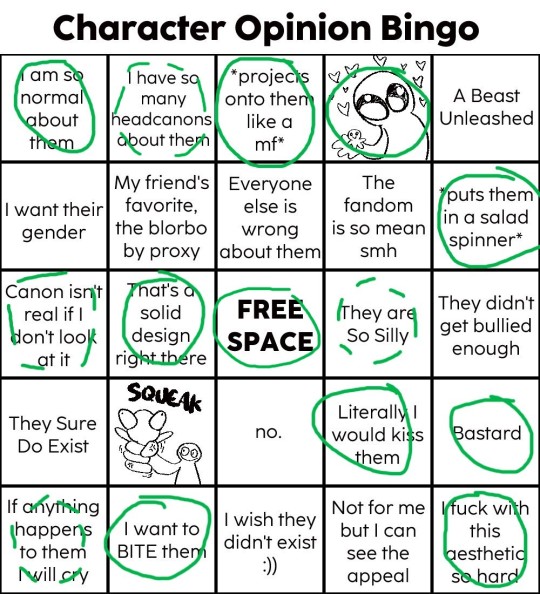
I wish I could circle that beast unleashed for an actual (almost) bingo but idk, sure you could make an argument for it for book 4 and stuff but it just doesn't seem like the right vibe (or perhaps I just don't know what vibe that square is going for to begin with).
Partial circle on the headcanon square because yes I think about him a lot but I don't feel like I go for headcanons that much? Like it's more about canon things, extrapolating from there, or just "wouldn't it be neat" kinda stuff, if that makes sense.
(Or maybe I just think my opinions are so obvious I don't even recognize the headcanony nature of them, y'all can be the judge of that).
I feel like there are folks in the fandom who do have some curious opinions about him but I've done a pretty good job of surrounding myself with like-minded folks so I'm good.
My canon denial mostly goes for the tragedy of it all, like yes Jamil's situation sucks but how about I just focus on happier things instead (yeah good luck to me with that).
Partial silly for the good old passion for dancing overtaking him and stuff like that. And when he's just ribbing his schoolmates. Because then there's also those parts of him that are anything but.
I don't think anyone would disagree that he's a bastard. I mean, book 4, masquerade, we know how much (that is, little) he cares by default.
Kiss and bite are mayhaps kinda related and do not even begin to cover the range of desirable actions but I'm just gonna leave that at that.
Also like sure red and black are also the dorm's colors, not just Jamil's, but come on, those are definitely my colors, too.
Tho I do tend to prefer silver over gold, but anyway.
And as much as I have my problems with snakes, the way the hood suggests a snake and all the other little details are just so cool.
And don't even get me started on his hair and the hoodie under the school uniform and all those little things he does with his looks to push the envelope (oop is this actually a headcanon?) and to have a more personalized look while staying within what's required/expected of him.
(if anyone else wants to grab the plain bingo card, you can find it here)
10 notes
·
View notes
Text
Arcane Ending Spoilers Below
I've already seen some folks talking about how the ending feels like it's saying "war fixes everything" or whatever and I think we need to talk about that.
Here's the thing. One of the most powerful uniting forces of all time is a common enemy. A threat larger than other typically quarreling sides will bring those two sides together to fight for survival when it becomes clear that if they stay divided, everyone will lose.
It is absolutely true that after a massive war against a common enemy, there will be peace for a time. It is absolutely true that promises will be made from one side to another that things will be different this time. A side that was traditionally in a position of power over another will suddenly offer an individual from the other side a seat at the table and say "see? we intend to do things differently from now on."
That's where the show ends. We see that moment of peace and prosperity brought by the end of a war fought side by side. But that's not where the story ends.
This is a tedious peace brought on by a common enemy that they no longer have to worry about. Over time, people will forget that common enemy, and they'll forget all of the things they shared with these sides they used to quarrel with. Quarrels will start again. Piltovan leaders will ask why they can't just exploit Zaun. The single Zaunite on the council will be outnumbered and outvoiced. The two city-states will once again be at each other's throats. Everything will go back to the way it was before. Nothing will change until the people in power actually make a change within themselves... and who knows if that will ever happen.
Arcane is about human nature. It's about what people do and why they do the things they do. It isn't about a utopian future where the oppressors and the oppressed sort out their differences and build a truly peaceful and prosperous society. We get to end this part of the tale on a positive note (people tend to like happy - or at least bittersweet - endings, after all), but that is not how it really ends. The show gives us hints of that when they show us the council.
Who's on the council? The same houses that have always been on the council, except with the majority of members being old people who are bound to still be set in their ways. The single Zaunite on the council is Sevika, who is clearly not thrilled about being there. This council is set up to fail the same way (if not worse than) the council failed before. Taking that with the knowledge that, by human nature, uniting against a common enemy does not create a peace that lasts forever, we can extrapolate that this temporary utopia is just that - temporary.
And that's the other thing about stories about human nature: They don't actually end. Until human beings completely go extinct, these stories will go on and on and on and on. History will repeat, twist, and repeat again over and over and over and over. If the ending doesn't feel satisfying, that's because it isn't an ending, and it was never truly meant to be. It's the end of arcs we've followed of certain characters, it's the beginning (or a new beginning) of others (looking at you, Mel), and it's the middle of history for societies that will go on long after the show has ended.
I mentioned this in my reblog about Heimerdinger's song, but this show was never going to be about the destination - it was always about the journey and everyone it took to get there. However you feel about that is however you'll feel, but don't for a second get it twisted: This story isn't here to tell you if war is good or bad. It isn't here to say if two cities can fix all of their problems forever and ever or not. It's just here to be a story about people. And to me, at least, it's a damn good one.
2 notes
·
View notes
Text
Drunk w/ the Only Saints I Know
I've seen this song titled both with the word "with" spelled out and with it abbreviated so I went with the abbreviated one just cause it felt right. Being the second song of the album, I've listen to it about twenty times at this point, both from having to restart the album from the beginning and from genuine interest. To me this one sounds like an 'ending song' of sorts, something to be played at the credit roll of a film. I dunno if this is just coming from the 'sleepy' tones or if it's the content of the song itself that gives me this vibe, but it's probably the one song I'd say I could imagine playing on the radio or something.
As a side note I'd like to admit that I'm more or less a stranger to alcohol, having drank I think a total of six drinks over the course of my life so far. The thing about anxiety meds and alcohol is they don't play well together (and can cause major problems when consumed in tandem!) That being said I'll have to extrapolate a bit here since I've never actually gone out to a bar nor have I been there with other people.
Throughout the song there are a couple themes, mainly that of friendship, death, and sainthood itself. The song begins with the title used as the first line leading us into the first reference to halos following immediately after. I wasn't raised Christian so what I know about saints is limited but I do believe that saints are usually depicted with halos or similar so this isn't anything too nonstandard. If we take a moment and examine this, we can also assume the perspective here is one where their friends are viewed as having done no wrong or otherwise being pure in some way. Now, having never been properly drunk I can't say how I would feel about the people around me if I was in that sorta state but I can safely say that normally I tend to view my friends in a similar way, putting them on pedestals and such. This feeling is probably amplified by alcohol.
Since the second major theme of this song is death and dying, the line "X-marks over our eyes" clouding the faces of their loved ones could be another way of explaining how they see themselves and their friends as being both drunk and also on the edge of death, made clearer with the line "This is how we'll look when we die". In this way the halo plays double duty as both a symbol of grace as well as doom, once again tying into dying as we've seen previously. After this we begin to speak about thoughts of regret as if the signer has already decided this would be a lethal evening. Honestly I think being drunk does that to a person.
Speaking of our friends and death, I've never had any of my friends die on me. This I imagine would make someone almost like a saint to me in a way, since I wouldn't really be able to hold it against them for not being here. I've known plenty of suicidal people so it's not hard to imagine it's gonna happen to me someday, and this song kinda reminds me of that.
My experience being around drunk people is that the more wasted you are, the more likely you are to say Dumb Shit You Might Not Mean. In the song, this is alluded to with the lines "Just because they love you anyways, Doesn't mean they'll forget everything you say" in a way, although I think they may also be talking more broadly, like about saying regrettable things in general. The singer then expresses they don't think about things despite the lines before discussing how they think of their friends, lending credit to the duality of drunkness.
The instrumentals themselves have sort of a floaty and warm quality to them, if that makes sense. I wish I had more musical terms under my belt but I've sadly lost them over time. Also not being familiar with how guitars work in general doesn't help. The vocals themselves are soft and weave through each other in a way that makes the last few lines sound almost like a mantra or prayer. This is especially fitting given the religious undertones. I feel like the repetition is also a reminder in a way, warning us "this is how we all look when we die"
Lastly you have a person who's described as thinking they're "all just assholes". This could also be an echo of the subject's feelings about themselves for either the things they've said in the past, or the simple fact they're drunk. There seems to be an undertone of regret that weaves through this song, almost like an anthem for it. I know from personal experience that it can become easy to get too introspective and I feel this song speaks to that condition, although I also think they're speaking to the specific kind of introspection that can come with being drunk. Again I'm extrapolating, as I've been high so many times I've lost count, but never really been drunk.
Speaking of which, I'm not high at all for this one so any sort of linguistical/grammatical mistakes are on me (yay!)
For better or for worse this one is a lot longer than the last so it feels good to be done with it and somewhat pleased with the outcome. These write-ups have been good writing exercise for me! Hopefully as I progress I'll pick up a few more terms so I can speak more on the actual musical aspect of them rather than mostly fixating on lyrics.
I think there are probably at least a couple run-on sentences and such so I apologize in advance for that! I feel like if I spent any more time trying to edit this it wouldn't be posted for at least a week haha.
Also I hope you find at least some of this rambling interesting and/or useful. I'm doing this for fun but also a bit for your sake in a way, since I know these songs are important to you. <3
#ramblespacetown#drunk w/ the only saints I know#blegh so fucken long!#haven't done this much writing in years tbh#feels good but also kinda bad?#like I wish I was less wordy but idk how to be#I guess practice makes perfect...
0 notes
Note
And now with the DSM-5 (Revised Text)

My biggest problem, and the reason why this ask is so fun (thank you so much for it it's one of my favourite asks ever), comes with the evaluation of the dsm-5 criteria: how do you test them in Jason?
A. A disturbance in attention (i.e., reduced ability to direct, focus, sustain, and shift attention) and awareness (reduced orientation to the environment).
=> This one seems obvious at first glance but it isn't. The deficit in attention is clear, wherever he is, Jason isn't paying much attention to anything that's happening around him. But in terms of awareness, how do you evaluate/define it? Jason appears acutely aware of his environment in that he's capable of registering it well enough to fight and win against an attacker in a spar, to learn fighting moves, to identity Talia, to identify children in need of food, to locate the food in the first place... Is this true awareness, in the way that's implied here? A lot of the learning he does can be attributed to the implicit nature of the task (as his procedural memory seems preserved). I would need more clarification from the dsm as to what exactly they mean by lack of awareness, here.
B. The disturbance develops over a short period of time (usually hours to a few days), represents a change from baseline attention and awareness, and tends to fluctuate in severity during the course of a day.
> Here we have an even bigger issue: what's baseline for Jason? Is it the way he was before his death? That was, like, three psychologically traumatic events ago, in a fifteen years old. The "jason who went through the trauma but didn't sustain any brain damage or displays his current symptoms" baseline probably looks very different from the "jason, a couple of days before Ethiopia, who didn't sustain any of this trauma" baseline. Furthermore, due to the nature of his injury, he very probably has cognitive impairment to which you would not have access to because of his symptoms (but on the nature of which we can extrapolate). What does the "Jason who has cognitive impairment but isn't so locked into himself" look like?
And if we're talking chronology, there's another issue: Jason has just woken up from a coma, which means he was in a state called "post-traumatic amnesia" which is a transitional confusional state that must not be confused with amnesia. But how to differentiate the two? Where does the post-traumatic amnesia end and the confusional state begin? Is Jason just going through the longest post-traumatic amnesia ever recorded? (I'd say no, because him crying at Bruce's mention implies the recall of autobiographic memory, and also this just feels like dissociative fugue diagnosis with extra steps, but still). So, we don't have any timeline for the way the difficulties settle in, and no known baseline to compare it to, which means no way to validate or reject this criteria.
I don't think the tendency to fluctuation is really there though, Ra's issue is specifically that nothing seems to be changing (or very slowly).
C. An additional disturbance in cognition (e.g., memory deficit, disorientation, language, visuospatial ability, or perception).
> How do you evaluate any of those things in a patient that's completely locked into themselves?
D. The disturbances in Criteria A and C are not explained by another preexisting, established, or evolving neurocognitive disorder and do not occur in the context of a severely reduced level of arousal, such as coma.
> So this is just saying "Jason's brain damage from his TBIs doesn't explain his deficit in attention/alterness and any other neurocognitive disturbance he may have". To which I say, for alertness and attention, I would say I don't particularly see it. But for the additional cognitive impairment we don't even know if he has? Memory deficit, visuospatial ability/perception and language are frequent symptoms that match Jason's TBI(s) up to the location of the hits (and disorientation in post-traumatic amnesia). You cannot prove that these disturbances would be due to the delirium.
E. There is evidence from the history, physical examination, or laboratory findings that the disturbance is a direct physiological consequence of another medical condition, substance intoxication or withdrawal (i.e., due to a drug of abuse or to a medication), or exposure to a toxin, or is due to multiple etiologies.
> This one we would need the hospital files to check. We mentioned the TBI as a possible cause, but the dsm demands evidence.
So now what?
It's clear we can neither reject nor confirm the delirium diagnostic hypothesis. Sometimes in the dsm the issue is you're hesitating between two or more disorders and the dsm tells you, very helpfully: to diagnose A you have to decide A is a more probable cause for the symptoms than B, and to diagnose B you have to decide B is a more probable cause for the symptoms than A, now do with this what you can and also fuck you and I fucked your mom. Those questions are called "complex diagnosis" and require a teams of professionals with specialists of the disorder you're trying to rule in or out. Personally, because of my understanding of the question of awareness in dissociation vs delirium, I would keep "dissociative episode" as my diagnostic hypothesis, and put "delirium" as my differential diagnostic hypothesis (basically when a psychologist evaluates someone to make a diagnostic hypothesis they always have to add other alternative hypotheses: "in case I was wrong thinking about A, you should check for B", or "yes I know you're thinking it could be B too, here's why I excluded it" type of thing.) But then instead of sending my patient to the psychiatrist to confirm my hypothesis, I'd orient them toward a specialized team, or at least, if I can't, to a delirium specialist, so they can investigate this hypothesis further before the team reaches any conclusion and the psychiatrist can diagnose a condition. And if you, anon, were my unpaid intern, I'd give you a raise, because that idea was brilliant.
So in conclusion: No, Jason does not have catatonia, I think he's dissociating but he could also have delirium and we'd need a much more thorough evaluation to rule that out, and thank god JT is here to get us to ask the real questions.
I have no medical knowledge but JT had me googling the five levels of consciousness I’m like what is this some specific form of hypoactive delirium JT has going on like what is thissss is this based off the movie Awakenings
Hell yeah! I love this ask so much
Let's talk about catatonia
Could Jason's TBI have given him catatonia?
Okay so catatonia is a syndrome that can be caused by either an underlying mental disorder (best known causes are schizophrenia and some forms of depression) or another medical affection (this is what the characters in The Awakenings have!)
I'm basing myself on the DSM-5 revised text here because it's my favourite classification (as shown by the fact I talk shit about it all the time). So, in Lost Days, Talia's hypothesis for Jason appears to be catatonia caused by another medical affection, this affection being caused by the brain damage he sustained. Because this hasn't been proven (i am, btw, very intrigued: does the LOA have MRIs? We know they interrogated the medical professionals who worked on him during his coma, but we don't have any info on that... What do the images say!!! I wanna know!!! And did he have an EEG? 😭😭😭 I wish we had these images... Alas.)
Anyway, so because the medical cause isn't confirmed, the actual diagnosis would be "unspecified catatonia" but that's more of a "eh, can't know for sure" diagnosis so it's not really important.
So I asked the one of my teachers who sees a lot of children and teenagers with TBIs, and he told me that while he couldn't tell me this didn't exist, he had never seen a patient develop catatonia as a result of a TBI. Because my personal hypothesis is a dissociative episode, I also asked my teacher who specialises in trauma if it was possible for dissociation to induce catatonia... He confessed that he wasn't sure what catatonia was and thought it was an outdated category people didn't use anymore and then when I was starting to detail the symptoms he kinda ran away from me in a pretty comical manner... (I'm not kidding, it was very funny). So, safe to say that this man (otherwise a really good teacher, with a great and in-depth understanding of trauma and the psychopathology around it) hasn't seen many catatonic patients lmao. So, that makes catatonia relatively improbable in terms of etiology, but nowhere in the dsm does it say that it's impossible for a tbi or dissociation to induce it, so let's check!!!
#ask#jason todd#jason todd meta#the jason todd psychological analysis meta#red hood lost days#dc#red hood#dc comics#me an unpaid intern: i want my own unpaid intern
54 notes
·
View notes
Text
kamukomahina gender/body headcanons
a bit of a ramble about my body, gender, and general appearance headcanons for them bcuz someone sent me a curiouscat prompting this 3k words of hyperfixation nonsense

Komaeda:
- He has a naturally lithe body, with a thin waist, broad shoulders and hips, which give him an hourglass. and a rather andrognyous body, which is "lucky" for him, because I hc him as nonbinary and gender non-conforming
- Gender-wise, as I said, I think he's nonbinary. Usually I do view Nagito as AMAB but I indulge in transmasc Nagito from time to time depending on my preference and how much I wish to uh, well, project, lol. But either way I think he would use he/they pronouns in a western sense. In japanese, however, they don't use third person pronouns that other people refer to them with, and in canon he uses the first person pronoun "boku", which is a "soft" masculine pronoun, in comparison to the "hard" masculine pronoun, “ore” (which Hajime uses btw!) which fits quite nicely, in my opinion! Also, in Japanese, you can be 'fluid' with your first person pronouns depending on the situation, so I think he could use more neutral or feminine pronouns should he desire it, too, to play on his gender non-conformity.
- Komaeda is very secure in his gender, regardless of being AMAB or AFAB. He does not care about stigma, or discrimination, he does not care about being "accepted" by broader society. Broader society is sort of meaningless to him, the average person and their ideas about gender and presentation and effeminity mean NOTHING to him. Whether or not a random person the street genders him correctly or treats him with respect is sort of, pointless? Because to him, most ordinary people are pointless nobodies. Their thoughts do not matter to him. I think he is still prone to insecurity, however, when around his "betters" but I just struggle to think he would degrade himself in regards to gender. to him, it's the least of his problems. what he cares about is hope and talent. He could dress femininely or wear makeup or straight up crossdress and not mind it, really. He thinks people would find a problem with it are the problem, because why does it even matter? It speaks to the way Komaeda is detached from societal norms & "normal" people, he did not grow up in normal circumstances, so he doesn't interact with the world normally by any means. he can mask and act normally to the best of his ability, often unintentionally?, but he simply does not fit into broader society and doesn't seek to.
- Komaeda loses weight really easily, and doesn't gain weight that well. This is mainly due to his many illnesses but also the medications he's been put on. He has a low appetite and burns weight rather easily, even though I headcanon that he eats like garbage (mainly junk food & takeout, since he obviously cannot cook). This makes him overall, health wise, not very healthy, and stick thin because of it. A stiff breeze could knock him over, tbh.
- He has a lot of faded scars, self-inflicted or not.
- Pre-despair (in HPA) he is fairly healthy but still lithe, and progressively his body deteriorates through his 2 years of hopes peak before the Tragedy begins.
- During the Tragedy itself, his body is at it's worst. he is almost nothing but bone at times, barely kept together by a need to live so he can see hope triumph. His weight fluctuates but he's very unhealthy. He's not anorexic or on death's door, but he's not well off, either.
- After being put into the neo world program, right after waking up, he's very, very thin and gaunt. he was in a pod on feeding tubs for an indiscernible but at least probably a month's worth of time? So he's just very weak, like he could collapse if he moves too quickly.
- But a while after waking, he goes into remission, and starts to gain more healthy habits due to being rehabilitated and cared for by Hinata, and gains some weight, finally at a healthy, normal weight. I still think he would struggle with putting on too much weight, but I am slightly fond of the idea that he gets a bit of healthy pudge after a while. To him, it's so foreign being healthy, that he honestly think something's wrong with him at first.
Hinata:
- Hinata has a very... average body, true to form. His hips and waist aren't too pronounced but he has a loosely "hourglass" shape, too, just not as exaggerated as Komaeda's in comparison.
- Gender-wise, I am EXTREMELY fond of transmasc Hinata. While I think I portray AMAB Hinata more than transmasc Hinata (in art and writing), I still firmly prefer transmasc Hinata. The reason I think portray otherwise more is just out of comfortability, but I've been getting better at comfortably portraying FTM Hinata. I have some reasons I prefer it and think you can extrapolate it from canon, but let's get into that
- Hinata, in my eyes, has an arc and story that fits perfectly into him just. Being trans. His desire to be someone else, someone better, someone he can proud of, and the way he overcompensates for himself and has an extreme inferiority complex would easily lend to him having similar feelings about his gender. To me, Hinata is a trans man who overperforms his masculinity out of insecurity and a need to pass. I see him as someone who would strictly use "he/him" in a western sense, which is lended to by his use of the "ore" pronoun in canon, which is almost hypermasculine.
- Even if he were AMAB, I think it still works, I think he's still someone who's insecure and tries to assert himself more strongly and therefore performs masculinity in a way to appear more confident than he is.
(side note: I actually read a bit about queerness in Japan and how it relates to gender performance and the use of pronouns, and read a bit about how queer women in japan tend to use "boku" and "ore" to perform masculinity, which I find neat. “Ore” was also sometimes used exclusively to show anger and dominance, which is why it's categorized as a "rough" pronoun. I think Japanese language, gender, and expression, and how those all relate to one another, are extremely interesting and if you get the time you should read about it lol)
- Body-wise, pre-despair, I think Hinata would. not have top surgery, obviously. I think he has a fairly average but leaning a little on the hefty side chest (pre-op) and binds it, hence the '91 cm' (but also he still has 91 cm post-op because bazongas). I also just think he leans on the "twunk" side of things at this point, not buff but not stick thin or without muscle, just kind of average with average strength and all, though I think Hinata would've tried to do sports and stuff to find his talent so he's in shape :)
- My personal, kind of amusing, but also kind of... thematical? Headcanon, is that during the Kamukura project, he also underwent gender transition. to be honest, while it may not make sense in modern Japan, I think we can suspend our disbelief for fiction, and also make the argument that Hinata's "transition" into Kamukura CAN be read, in some part, as relatable or at least familiar to the trans experience. Iit is not out of the realm of possibility, either, to assume that because many bits of society in Danganronpa are advanced (specifically science, is extremely ahead of our understanding, almost sci-fi like at times) certain attitudes about gender and sexuality can be smoothed over more in a Japanese context.
(side note: I also think that science-wise, we can suspend our disbelief, and assume that top surgery and bottom surgery are much more advanced in this universe, given the almost unbelievable levels of science in Danganronpa, such as memory wipe, mind control, completely realistic virtual simulation, um literally everything about Kamukura which is body modification and brain modification to an extreme, etc. I think it's kind of fitting within these to assume that... Hinata/Kamukura could just, gain a functioning penis, lol)
Kamukura:
- Kamukura would have a. "Perfect" body. it's stated, I'm pretty sure, that they modified not only his brain but his body, because he needs to be able to perform every talent under their belt with ease, and his strength, instincts, technique, are all superhuman. So it's clear to me he'd have a buff body. toned muscles and all. He wouldn't really feel a need to keep it up, though, but I think since they're very... artificial (basically fucking steroids?) they wouldn't fade from a lack of keep-up.
- Kamukura also rarely ever is injured, but when he does, his body heals rather fast and can care for himself adequately, because again, his body is modified to a point of almost inhumanity.
- Gender wise, Kamukura genuinely does not care. however, I am not one to think that Kamukura is "a different person" from Hinata, rather, he is separate from Hinata, but an extension of Hinata as well, proven that he experiences some of his emotions even if subconsciously and without understanding them. he isn't a different personality or person developed in Hinata's body, but a very traumatizing, repressed, and manipulated version of Hinata given a new name, with memories repressed. He's like Theseus's ship in human form---if you get rid of everything that makes someone themselves and replace it, bit by bit, is it the same person? Technically, yes, but... truly? Who knows.
Because of this, I think Kamukura would have a leaning toward masculine gender performance (in canon, in fact, he uses the soft masculine pronoun "boku" in stead of "ore" like Hinata) BUT I think he is still very nonbinary. In a western sense, i think he would use he/they pronouns, but not really care if someone mistook him for a woman, I suppose.
- His appearance, unironically, is very nonbinary or "he/they" to me because he's wearing a suit, the archetypal form of masculinity, but has extremely long hair, which is considered feminine, and speaks softly (dully). Of course, the bishounen "pretty boy" appearance isn't uncommon or considered less masculine in japan, I think, but there is still a different between soft masculinity and rough masculinity in japan, which lends itself to being interpreted sort of gender non-conforming by western audiences :)
- Kamukura, due to his apathy, struggles with self-maintaining, but as we all probably know i am extremely attached to KamuKoma and thus headcanon that Servant helps him, sort of like a royal servant would royalty in the old days, take care of himself by bathing him, brushing his hair out, grooming him, etc. partially out of duty, partially out of appreciation for Kamukura's body, and partially out of maintaining his sort of "perfect" look since Kamukura, especially post-Junko death, is perceived widely by the public as the new leader of the ultimate despair, even if he is ambivalent to such a title.
Post-DR3 Hinata/Kamukura combined:
As I rambled on about previously, I don't think that Kamukura and Hinata are separate people or personality, I really dislike the interpretation that they are like a "split personality" or operate like DID, because they do not "form" like DID, but also in canon, are not portrayed as separate people.
In post-dr3, Hinata instead says that he is both of them, because he is. Kamukura is Hinata, always was, but had been given a new, false identity, had been stripped of his previous self, his memories, his personality, and crafted into something new. but that did not "split" his brain into two people. It simply repressed who he once was, and made him someone he now was. But when Kamukura regains his memories, his past self, through the means of the new world program by restoring his own memories after SDR2 concludes and he wakes up, as well as doing the same for everyone else, he decides to be "Hajime Hinata" who he always was, but carrying and shouldering the weight of what "Izuru Kamukura" had been, become, and done. Hinata *is* Kamukura, he answers for Kamukura's wrongdoings, his crimes, as something he had done as a different person who's mind operated differently, due to being artificially suppressed, modified, into an apathetic tool for the scientists who made him, and later and aimless, bored individual who simply sought meaning he did not have in the unknown of what despair would be at it's climax. And if hope could overcome it.
As such, I think, when Hinata's self is brought back into the mix, and he now deals with Kamukura's apathy and boredom in part, but much less consuming and much less often, I think hinata is less staunchly "masculine", does not overperform it anymore, and is trying to understand what his past means to him, what his present is, and what his future will be. I think that Hinata would still primarily use he/him (or still use "ore" in Japanese, as it's also a means of his personality, which is a bit rough around the edges and blunt), but be more ambivalent to rigid gender expression, still finding comfort and idealness in masculinity, but not be made dysphoric or feel frightened, uncomfortable, with non-comformity or anything like that. being boyish, masculine, is what he enjoys, but he's comfortable in it now, doesn't need to prove himself or overperform it. He can explore nonconformity without feeling like his gender or masculinity is at threat, even if it's not his preference outright.
Body-wise, I think it's safe to say he retains Kamukura's muscle and all, but Kamukura didn't put much effort into the everyday machinations of being a human being in general, and Hinata is much more fond of food than him now, eats more often, and I enjoy the idea that he gains a little pudge and has a kind of "dad bod" almost, post-DR3? lol.
Both for Hinata and Kamukura I don't see their bodies as “bara�� or overly buff, masculine, but a kind of comfortable middle ground between twunk and hunk, lmao. I think they're also averagely hairy, not overly so, very lightly. kind of well groomed, and all. Hinata, pre-despair, put not so much effort into his appearance but still some, especially in trying to pass. (In fact I think his hair cut looks like a home job, all choppy and stuff, which fits him in my opinion, something done by his own hands even if messy and imperfect, he still prefers to be in control of it. also fits the trans headcanon tehe).
Izuru put very little if any effort into himself, only the bare minimum necessary to function, but servant helped him upkeep it to a perfect standard. Hinata, post-dr3 now, finds himself putting you know, an average amount of care into himself and his body, enough to be healthy, but not overly critical and conscious of himself.
Komaeda i have always seen as someone who takes a good deal of care about himself, merely if to alleviate the "disgust" of his appearance and body, by practically preening himself. He is someone who is good at cleaning and seems to appreciate clean and well kept spaces, so I think he would have a similar attitude toward himself. even if he is insecure, and of course, struggles with mental health and may slip at times in his routine in keeping himself well-kept, I think he still maintains an appearance for the most part, at least in his later years (teen to young adult). An argument can be made that he cared less in his adolescence because he had much more apathy about the world, but when he gave himself a purpose with hope and talent, I think he would care for himself a little better, even if his was spiralling mentally.
His hair is always washed, it is just very curly and prone to mess, so it often looks like perpetual bedhead, even when he combs and brushes it. His skin is soft even if a little worn by his tendency for accidents & injury, it's still soft and almost luckily so, and he takes pride in moisturizing and cleaning himself. His skin is a little sickly, still, and I think that despite having blemishes, scars, etc. Komaeda manages to look pretty in a strange way, not conventionally beautiful, but almost ethereal? He's just *pretty*, there's no way to explain it, he is nice to look at even with all his "flaws" and imperfections. Even when he's sickly and bony, even when his cheeks are gaunt or his hands shaky and weak, when his hair is a tangled mess or his clothes are dirty, he's nice to look at in a way that's nonconventional, and it's sort of mesmerizing.
Hinata I think is very average but also in a way that's nice to look at it. He's not ground-breaking hot or conventionally attractive, he has a good body, a nice face, and hair you could play with a little if you wanted. I think what's appealing about him is his normalcy, he's not trying too hard or "gifted" gene wise, but he's just kinda nice to look at, he's enjoyable to be around, an understanding person, or at least tries to be even when he fails, and despite having flaws, insecurities, blunt, he is someone you're drawn to because he's one of those people that's just, easy to talk to? An emotional anchor, almost. The kind of guy everyone kind of knows and has talked to at least once, even if you're not friends with him personally, not because he's cool or popular or anything, but because he's a normal dude who's easy to trust and talk to.
Kamukura, on the other hand, is intimidating, appearance wise and personality wise. he looks, strange, anything but normal, his eyes are red and his hair is this dark cloud that envelops him. His face may still be that plain one Hinata has but faces can be changed by the surrounding attributes as well as expression and such is true for him, with his apathetic and cold expression as well as otherwordly characteristics, he comes off as much more beautiful in a dark way, kind of? In a way that's intimidating or a little daunting, but he's still very beautiful. mesmerizing.
okay, thats my ramble. ty.
178 notes
·
View notes
Note
Hello! I love your LukaNette fics and content, and I was wondering if you had any tips to staying true to Lukas character? I’ve been wanting to write luka fics for awhile now, and i haven’t been able to not because of lack of inspiration, but worry for not being able to stay true to Luka’s character, along with the other MLB boys. I’d appreciate any tips that you could give, and again, I love and admire your work so much! It never lacks to put a smile on my face.
Hello!! Thank you very much! 😁 I’m flattered that you enjoy my work and that you would want my opinion. I’m sorry this took so long, I thought I’d wait for the weekend so I’d have time to put thought into it, and then Halloween ate the weekend. 😆
So, part of the fun of fanfic is extrapolation, taking what you know about a character from canon and building on it in a way that makes sense to you. Everybody's interpretation is going to be a little bit different and that's totally cool! It gives us a nice variety of stories. It does mean that not everybody will agree with every interpretation, but don't let someone else's preferences (including mine) dictate what you believe to be true to the character. Don’t stress about it too hard; if it seems true to you, if it seems in character for you, that’s good enough. It’s really easy to sabotage yourself worrying about whether your work is “good enough” and I don’t want you to fall into that trap. At some point, you have to let go of “good enough” and just write. Embrace imperfection. You’re allowed to mess up, to grow as a writer, to look back on older works and say ‘hm, I’d do that different now.’ You’re not defined by any one work or by the level of your ability at any one stage in time, so just give yourself some grace and go for it!
BUT SINCE YOU ASKED. 😆 Here's a rambly, probably incoherant discussion of my personal Laws of Luka that I consider the foundation of Luka's character. Again, these are entirely my own opinion, and you’re entitled to disagree, ignore, and alter to suit your own perception.
To be honest, this is usually a really intuitive process for me so it’s a little hard to break it all down coherently, but I’ll try.
First, Luka is the one person in the series who really sees that Marinette--Marinette--is special right off the bat. It’s something I incorporate almost every time I do an AU. I tend to focus on the eyes, because it was a thing I noticed early on in the series, how much her eyes stand out in her face. It doesn’t have to be love at first sight if it’s not your thing, but to me, there’s always something that makes Luka notice Marinette, makes him look twice, makes him keep thinking about her. Almost everyone underestimates and undervalues Marinette and only really takes notice of her when she’s Ladybug or having a Marinette Moment. I love the idea that Luka gets it from the beginning. (To me, it’s a foregone conclusion that Marinette is special, since she’s the central character, the hero in charge, the One On Whom All Hope Rests. So I see this as Luka being the only one to instantly see the truth about her.) Partly it’s that Luka is tuned in to people; whether you choose to make him someone who likes to be around people or someone who’s awkward around people, he’s perceptive and insightful and he can get a good idea of what’s going on around him. I know a lot of people cling on to the heartsong idea as a justification for this, but to me, Luka’s just observant and intuitive, and he sometimes processes that as music, but it’s not really a supernatural talent. If you want to go with more straight up musical empathy, that’s cool too.
Along with that, Luka’s very straightforward. Over and over again, we see him notice that something is off with someone (usually Juleka or Marinette) and confronting them about it, and addressing the issue straight on. I’ll admit right here that I’m already biased against plot lines that can be resolved by the two characters actually talking about the problem, but that’s especially true with Luka because he doesn’t sit on things. If he thinks someone is sad or upset, he says so; if he feels something, he tells them. Usually he does it in an incredibly gentle way that doesn’t actually put the person he’s talking to on the spot. He quietly acknowledges the truth without putting Marinette especially in a position where she's forced to own up to something she’s not ready to admit. We saw this in Frozer, when he tells her to go talk to Adrien without confronting her directly about her feelings, and in Silencer, where he walks away after his confession rather than waiting for an answer, and in Felix, where he doesn't make Marinette reject him outright and instead just says he'll be happy for her and Adrien. He doesn't press her in Truth until he's been ditched multiple times, and even then, he's very gentle about it. He takes her to a place that he finds calming, he sets things up by opening up about himself and why he finds this pattern upsetting, and he even directly addresses the Adrien issue before he finally asks Marinette to give him a straight explanation.
He respects Marinette’s agency. He doesn’t push her into anything, he gently encourages her and gives her the opening to make her own choice. He doesn’t make his feelings her problem, and he doesn’t blame her for being confused and not sure what she wants. Whatever jealousy he feels doesn’t manifest as anger (this is my biggest pet peeve; sure, Luka can be jealous, that would be human but he’s never taken it out on Marinette or Adrien, and it makes me batty when people act like you can’t feel intensely for someone without the kind of jealousy that makes you unnecessarily angry and cruel).
Luka's also tuned into Juleka. He knows when she's upset, he gives her validation and encouragement (Reflekdoll) and he makes sure that she doesn't get pushed to the sidelines (Crocoduel). (I could probably gush for hours about his scenes in Crocoduel, despite the way I feel about some of the dumbass decisions they made in that episode). I wish we got more of the sibling and family interactions, but the snippets we’ve seen really underline it. He’s the one to encourage her, to bring her forward, to give her an opening to speak. Luka's mother is impulsive and emotional, his sister is shy and anxious, and I just get the sense that he’s been the grownup in the house for a long time. He's calm and rolls with whatever's going on; despite the volatility between Jagged and his mom in Crocoduel, he's able to deflect and diffuse the argument.
Note: Luka has never said that he’s bad with words. He says he’s better with his guitar, that music makes things clearer. But he’s actually very good at knowing what to say and deflecting awkwardness and weirdness. Nor does he use his guitar in place of words, but in addition to them; in other words, he uses the guitar to illustrate his point, but he’s still talking in the process. He also doesn’t actually use that many musical metaphors. Some, yes, but don’t feel like you’re messing up his character if you aren’t cramming in every one that you can think of. Use them when they feel natural, but don’t stress about it. It’s better to be simple than to use a tortured metaphor just for the sake of having a musical reference.
Looking at his family, we see that Anarka doesn’t believe in rules or even really organization; she’s a free spirit, a creative, and we can expect that some of that would transfer to her children. Luka and Juleka’s aesthetics tend to support that, at least in my opinion, not that I’m especially up on styles to be honest. Question the cliches when you write him; is Luka really the person who’s going to show up in a suit with red roses and a rented limo? What effect do you think being around such a strong female personality had on him? Luka’s effectively surrounded by women all the time, so I tend to write him with a little more awareness of the way a woman thinks. Some of this is not being squeamish about things like bras and periods and “girl stuff,” and some of it is knowing when a woman might feel uncomfortable. For example, whenever I have Luka lean in on Marinette, he always leaves her a way out. He’ll only lean on the wall with one arm, so she has room to get away if she’s uncomfortable, instead of caging her in so she’s stuck. He doesn’t block her exits even when he’s being intense and trying to command her attention. That’s a really specific example, I know, but it’s the mindset I’m trying for. He’s just a little more attentive to that kind of thing than your average guy. At the same time, he’s very hands on, he’s always touching people, usually on the shoulder or upper arm, so I don’t ignore that either. Sometimes I have him struggle with that tendency.
Despite his tendency to withdraw from crowds Luka’s very comfortable on stage; he doesn’t look weird or awkward when he’s performing, or like he’s not into it. He knows how to perform. I like that this gives his personality a little more verve and vigor than the laid-back person he is on the day-to-day. I like the idea there’s a little bit of showboater in him that can come out.
I could go on and on and on but hopefully that gives you a little bit of a thought process to start with, and get some ideas really bubbling for you!! Good luck in your writing endeavors! 💜💜💜
#quickrambles#character analysis#analysis is kind of a pretentious word for this lol#character impressions?
14 notes
·
View notes
Text
YYH Recaps: Episode 1, Surprised to be Dead
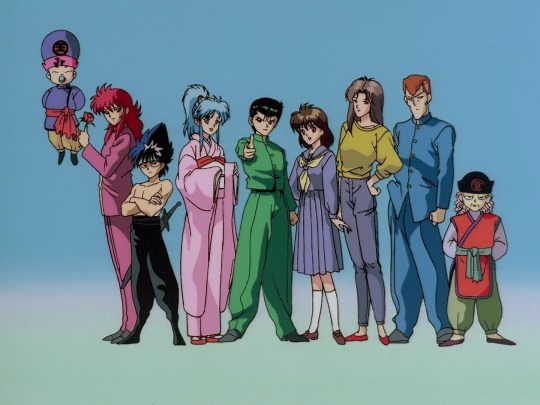
Hello, all you hypothetical readers! It's a beautiful spring day and I have a free afternoon ahead of me, so what better time to start another massive project while I guilty stuff my other WIPs deep into the depths of my hard drive? Yeah. Iffy life choices aside, someone mentioned a few weeks back that they'd love for me to recap a show I have more positive things to say about than negative (RIP RWBY) and ever since Netflix announced that their live-action adaptation of Yu Yu Hakusho is in the works, I've been itching for a re-watch of the anime. With the RWBY hiatus underway, it seemed like the perfect time to fulfill both desires.
Before we begin though, I'd like to touch on a few things that are going to influence this project.
First, YYH is near and dear to my heart. Written by Yoshihiro Togashi in the early 1990s and later adapted for an American audience by Funimation, I had the pleasure of experiencing this story five different ways: as a serialized tale in Shonen Jump, a binge read when I had the money to buy the manga, tiny snippets of the anime on Adult Swim late at night — don't tell my parents ;) — as an after-school treat on Toonami, and then years later as a re-watch when I introduced it to a friend (who, in turn, blessed me by having us watch Fullmetal Alchemist next). I used to keep a Hiei bookmark in everything I was reading, the spirit gun made it into our witch-wolf-space adventures on the playground (middle school was wild), and there was a long period of my life where I tried very hard to teach myself to stand with my hands behind my back, precisely as Genkai does. Spoiler alert: I failed. So to say I love the series is... a little bit of an understatement. I bring this up simply as a way of demonstrating that there's more than a bit of nostalgia attached to YYH for me and that will inevitably cloud my reading of it. How can it not? So that's just something to keep in mind as I work through a series that, like any having hit its 30th birthday, has its outdated, flawed, and other questionable aspects.
Second, but very much connected to the first point, is that these are pretty casual recaps. I summarize and extrapolate, focusing primarily on plot and dialogue (but with the occasional cinematography aspect tossed in). I'm not conducting research on the cultural history here — something that will come up at least once in this episode — I'm not arguing an overarching thesis, and I've never been someone who focuses on the author/production/trivia of a series. I'm here for the story as the story is presented to the viewer. If you've read my RWBY Recaps, this will function precisely the same way, with the only difference being I'm engaging with a finished text as opposed to an ongoing one, so there’s a lot less, “Maybe ___ will happen” theorizing going on.
Third, I obviously recommend that you watch the show yourself (you can find it on YouTube!), but you don't have to know the series to follow along. As these massive paragraphs attest, I tend to be both detailed and verbose, so we'll be covering every major plot point — and most of the smaller ones too.
Finally, I'm working from the dub. I know, I know, the horror. But it's what I grew up on and, honestly, I think it's superior to the sub. YYH's dubbing is in a class all its own and to this day there are very few shows that compare to it. Trust me, it's a good call.
That's enough of the boring chit-chat though. Let's get started!

Our very first episode "Surprised to be Dead" opens on a crowded street. We see lots of traffic, people going about their business, and a pedestrian crossing sign that, crucially, turns red. This is our normality and, like in every genre story, you need to break that normality at some point so that the protagonists can go on their fantastical/supernatural/science fiction journey. YYH eases us into things by first breaking the normality of an everyday afternoon: there's a screech of tires, quick shots of a man pushing a child out of the way of an oncoming car, and then his back is hitting the windshield. We begin this story with a horrible — but otherwise mundane — car crash.
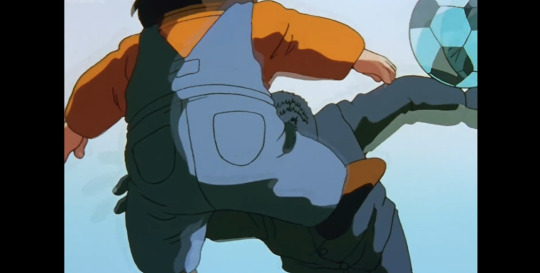
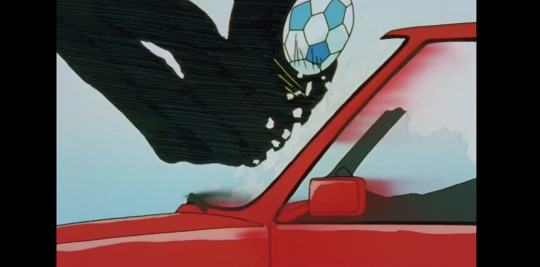
Now, these flashes alone have a fair bit to unpack. Despite later getting a brief shot of the man's scared face right before he's hit, the moment's focus is really on the child. He's the one foregrounded in the initial, slow-mo shot. He's the one who appears in color while the man is kept in shadow. This isn't just a hit, it's a rescue. The camera is also careful to follow the soccer ball this kid was playing with (more on that later in the episode), with it flying through the air as the man is hit and bouncing to a stop in the street, acting as the dramatic finish. It's childhood! It's innocence! It's play on a sunny afternoon! And it's all gone wrong.
This moment is chaotic and even a bit confusing. Not in the sense of what's happening — that is quite obviously a guy being hit by a car — but who the victims are, how precisely this came about, or even why we're meant to care about this beyond a generic capacity to feel for other human (fictional) beings... that's all removed. And it works. As the crash takes place, the camera pans across the stunned crowd and we, the viewer, become a part of that crowd. They don't know what precisely is going on either. We're all just horrified onlookers as a sudden tragedy takes place. We're all watching the same show.
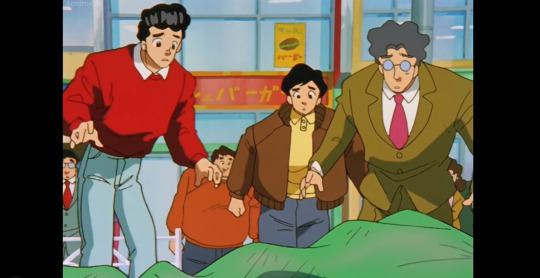
So everyone realizes this guy has been hit. People are staring in shock and someone calls for an ambulance. We see the driver fall to his knees in the street, distraught, shakily saying, "I didn't mean to..." It's a very serious and emotional scene that —
— is immediately tempered by this guy waking up, complete with a cute 'pop!' sound effect when he opens his eyes.

This is YYH's brand, this Very Serious Circumstances skillfully interwoven with casual indifference/comedy. It's admittedly far from a unique brand, but it's an excellent choice given that this is the same attitude that will drive 99% of our protagonist's interaction with the world.
Speaking of said protagonist, our guy wakes up, opens his eyes, and realizes that he's floating. There's a great, disorientating shot from his perspective where everything is upside down, causing him to nearly fall out of the air. Well would you look at that, he's as confused as we are. It's our audience surrogate!
A narrator says, "And so it all begins. This boy's name is Yusuke, he's fourteen years old, and he's supposed to be the hero of this story. But oddly enough, he's dead."
Game of Thrones might have made it popular, but YYH did it better.
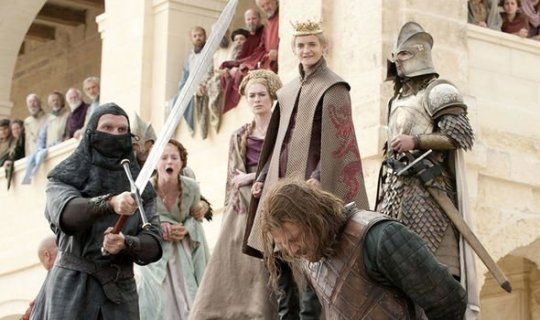
(Yeah, yeah, I know one death kick-starts the journey and the other is a shocking twist. Just let me have this.)
Now, it's a weird introduction, right? At least at the end. The announcement that change has occurred, a name, an age... that all checks out. But "supposed to be the hero"? What the hell is that “supposed to” mean? Our narrator gives us the easy, surface answer: "But oddly enough, he's dead." We're capitalizing here on the audience's expectation that death ends a character's journey and though they may have been a hero previously, they can no longer be one moving forward. That function within the story has passed. So it's this intriguing question of, "What kind of hero do you have when that hero is dead from the start?" but as we'll see soon, there's an additional meaning here of, "How can Yusuke be the hero?" As this premiere sets up, Yusuke doesn't act like the hero is “supposed to” act.
Until he saved this kid.
But right now he's just confused: "Okay, this is weird. Stupid weird."

Two EMTs arrive on the scene and are hilariously useless. You know how in any medical drama a doctor will stop CPR after a couple of seconds because obviously you're not going to spend half the episode on realism? Well, that's this only a thousand times worse. One guy just looks at the kid and announces he's fine except for some bumps and bruises. Meanwhile, the kid is sobbing.
"Well, at least one of them is," replies the other EMT, because I guess he can tell Yusuke is beyond hope without taking a pulse or anything? "I hate cleanup," he complains as they load his body onto a stretcher because that's? An empathetic response to have??
Honestly this scene is wild.
Yusuke is understandably upset that he's, you know, dead and all. He starts hounding the EMTs who, unable to hear him, just go about their business of taking the kid and his body to the hospital. "You think you can just do whatever you want because you have that stupid uniform on? You can't just write me off. Listen to me!" and Yusuke tries to punch one of the EMTs in the head, resulting in him floating right through.
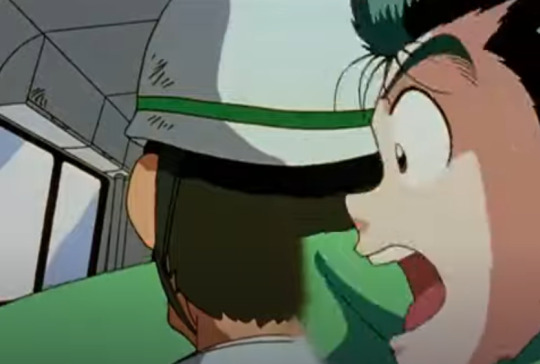
What a great way to introduce your protagonist's personality. We see here that when things go wrong Yusuke's default emotion is anger and it starts creeping in even before he thinks the others are ignoring him: "Stupid weird." He has problems with authority — "You think you can just do whatever you want because you have that stupid uniform on?" — is used to others listening when he gets angry — "You can't just write me off!" — and is poised to use violence at the slightest provocation. Yusuke is a guy who, right now at least, is ready to punch first and ask questions later.
As Yusuke floats back up into the air and the ambulance drives away, he finally cools down enough to try and think his way out of this. "It's not like this is the first time you've been in a jam,” he thinks. Yusuke recalls that yeah, something was different about today...
...he actually went to school.
Catch me laughing that this idiot boy equates the weirdness of him dying with going to school. Good lord.
Anyway, this jumpstarts our flashback. We open on a generic, anime middle school (that always feels like a high school to me) where the principal is calling for Yusuke through the loud speaker. Oooo someone’s in trouble! We follow a young girl up to the rooftop and she gets a classic hair-blowing-in-the-wind moment to establish that she's our love interest. Meet Keiko Yukimura.
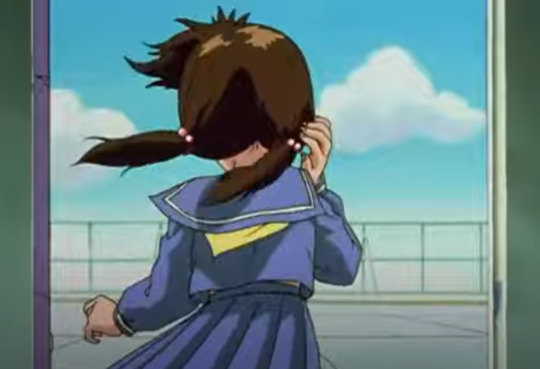
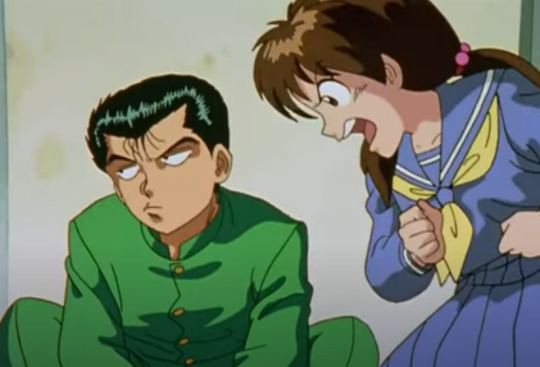
Keiko finds Yusuke hanging out and immediately starts lecturing him for trying to chew gum and refusing to wear the boys' uniform. "Oh, give me a break, Keiko. I look better in green." Note that it's here we learn her name and it's an easy, casual way to introduce it. I bring this up because Yusuke's introduction via our narrator is very much... not that. It's an on your nose statement about his name, age, and importance to the story, and if you're just starting the show in 2021, it might come across as a rather armature move. Like something out of a kid's show, perhaps. Yet here we see that this was a deliberate choice, considering that YYH is capable of introducing character information naturally when it wants to.
This moment also tells us that Yusuke cares a great deal about his image. More on that in a bit. Because Keiko isn't finished her list of grievances yet, going on to say that his attendance record has hurt their entire class, hurt her as class representative, and if he keeps going down this path he won't even graduate middle school. "Sometimes I think you don't care about anyone but yourself and then you don't even do that right!"
They're legit complaints. Too bad Yusuke is busy looking up Keiko's skirt.
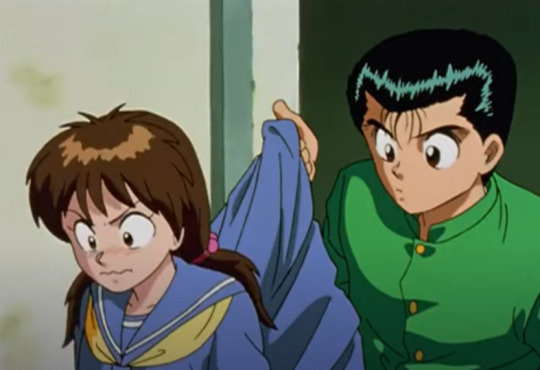
Yeeeeah. Sadly, this is common for anime, particularly a 90s anime like YYH. Even presumably more progressive series like My Hero Academia feature characters like Mineta, whose entire personality is being a pervert, and the creation of abilities that "require" kids/young women to be scantily clad. See: Yaoyorozu. YYH is no different in this regard, with various forms of sexual harassment functioning as a shorthand for how much Yusuke secretly likes Keiko. "Boys will be boys," right? Obviously not.

Like so many others series, the creators get away with it because they’re framing it as a bad thing. It's totally fine because look, Keiko slaps him! This is teaching the viewer how wrong this behavior is. Never mind that this is clearly an established habit between them, that Yusuke laughs off Keiko's discomfort, and that the whole scene is meant to be funny for the viewer. That's the real purpose here; it’s not a PSA on harassment.
That, and to establish the long-suffering love Keiko has for Yusuke in turn, largely stemming from a life-long friendship. "Dumb boy! He hasn't grown up a bit since he was four years old." We see that Keiko's early interactions with Yusuke have given her insight that others lack. As she heads down from the roof she runs into two girls hiding around the corner, too scared to come out lest "the great Urameshi" set his sights on them. Isn't Keiko terrified of what he might do to her? "Or worse, what others might say of it?" Like any classic high school middle school setting, one's reputation is king. Yusuke cares about how others see him — maintaining that tough boy attitude — and the girls care more about what the rest of the school might think of Keiko's interactions with him than the presumed harm Yusuke could do to her. They heard he can summon 2,000 men with just a whistle and that he "kills for fun!" But that means nothing in the face of people talking about you. Despite being one of the most popular girls in school, Keiko is the outsider here via her disinterest in what other people think.
The animation changes here, giving us a good look at how the girls picture Yusuke: tough, scowling, surrounded by shadows, and backed by an entire army.
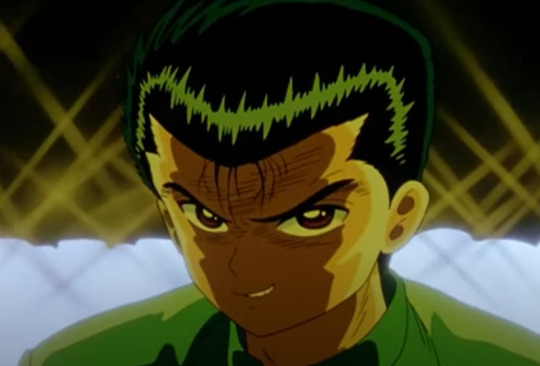
In contrast, we've already seen what Yusuke is really like.

Keiko laughs the image off too. Yusuke is more like a "lamb" than a killer and besides, he couldn't order around two people, let alone two hundred. "He doesn't have many friends."
"That's not what I heard," says one of the girls.
"Yeah," goes the other. "I think we would know."
Again, rumors rule here, with whispers in the hall considered more reliable than someone who interacts with Yusuke on a daily basis. Keiko doesn’t have a hope of changing their minds.
Oh, as a side note, I love that they gave Keiko Miyazaki-esque hair. It's very emotive.

Yusuke escapes outside where the principal is still calling for him to report to his office. He overhears a conversation around the corner and we cut to two boys, one of which is showing a wallet off to the other. He explains that some bully tried to rough him up, but he said he was Urameshi's cousin and the bully took off, dropping his wallet in the process. The guy's friend is impressed, but what is he going to do if Yusuke ever finds out he lied? Not to worry, he says, that "blockhead" would probably think it's true even if he did somehow hear.
Yusuke, obviously, does hear about this and he, also obviously, does not believe this guy is his cousin. He looms ominously and they scurry up against a wall, terrified and offering him the wallet as an apology.
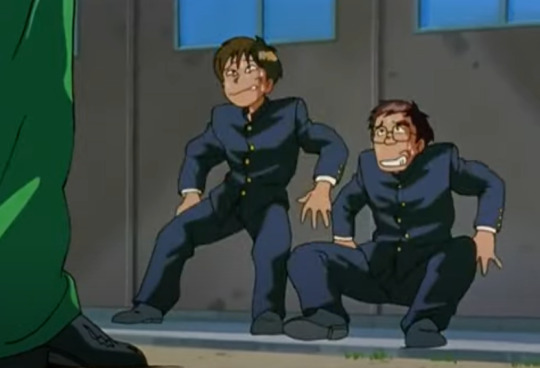
"You think I want your money?" Yusuke yells.
YYH is, in many respects, a rather simple story, but I appreciate the hints of complexity in these otherwise straightforward interactions. It's not that this guy used Yusuke's name to steal a wallet, he used it as a form of protection against another bully — a far more sympathetic motivation. It's not that Yusuke's fearsome reputation has resulted in any genuine respect because once people think they're safe they reveal how little they think of his intelligence — he's a "blockhead." And Yusuke, though intimidating and violent, is not your average, schoolyard bully. He doesn't care about money, only the insult and the damage this guy using his name might have done to his reputation. There's a little more nuance here than you might otherwise expect.
Also, note how dark the boys' standard uniforms are and how much they blend into the rest of the world. Yusuke, as our protagonist, stands out in his bright clothing. He was right, he does look better in green!
So he's ready to clobber this kid when one of the teachers arrive: Mr. Iwamoto.
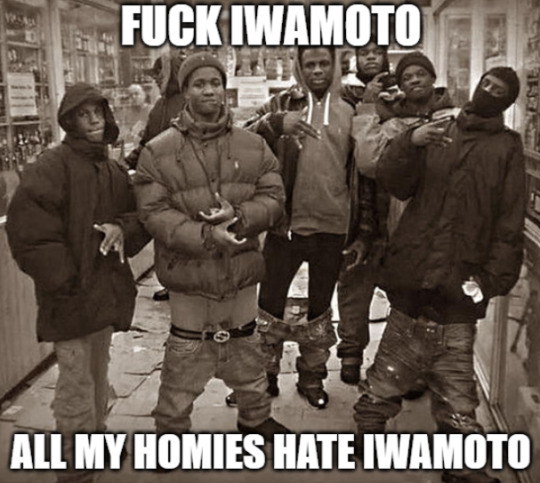
Iwamoto demands to know what's going on, but the boys are too terrified to rat Yusuke out. Noticing the wallet on the ground, he assumes that Yusuke was after their money, something that greatly offends him: "Whatever!" Iwamoto goes on to say that, "No good weeds like you should have been plucked a long time ago," making it clear that he considers Yusuke a hopeless case. The positive aspects that Keiko sees, as well as the complexity the viewer sees — to say nothing of his introduction of saving a kid — aren’t considered here.
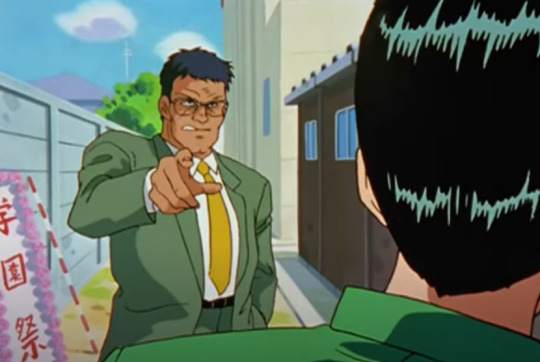
Notably, Iwamoto exists in part to show us what Yusuke could become. Not a teacher (he's obviously not attending school enough for that!), but a cynical man who is cruel for cruelty's sake. Yusuke is already barreling down that path, ignoring Keiko's advice, terrorizing other students, trying to punch EMTs, etc. If his life (or afterlife...) hadn't changed through that accident, this is the kind of person Yusuke might have grown up to be, and we can see that clearly in the visual parallels between them. Dark haired men dressed in green who scowl with ease and toss out cutting insults. Yusuke is staring his future in the face.
For now he walks off with a final shot, "You shouldn't talk. It makes you sound stupid." This time Yusuke makes it to the school's entrance and tries to enjoy his second attempt at chewing gum, but someone hits him in the back of the head.
"Okay, somebody's DEAD — ah. Sorry, old man."
"That's Mr. Takenaka to you."
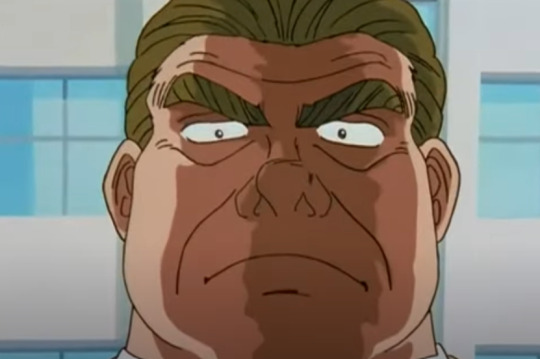
Our principal has finally left the office and hunted down Yusuke for himself! Putting this interaction immediately after the one with Iwamoto allows the viewer to compare them. Yusuke might be irreverent towards his principal, but it's clear there's still some kind of respect between them. Yusuke only starts threatening because he doesn’t realize who hit him and once he does realize it's Takenaka, he immediately apologizes. That "old man" comes across as a teasing insult and Yusuke allows himself to be briefly dragged back towards school, rather than throwing a now classic punch. In turn, Takenaka cares enough about Yusuke to try and keep him on the straight and narrow. He utilizes Yusuke's preferred language — violence — but in a casual way, nonthreatening way: slight hit to the back of his head, noogie, pulling him along by the ear.
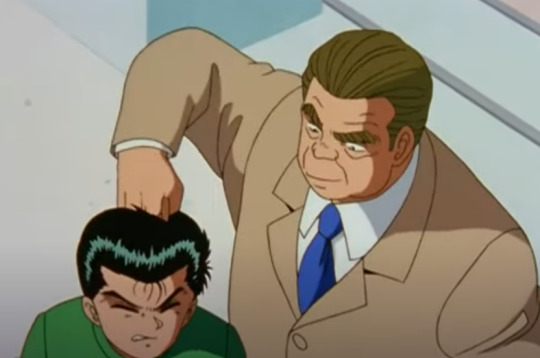

It's the sort of physicality we're used to seeing in media between a parent and child who are outwardly antagonistic, but actually share a deep bond. Takenaka is also careful to frame their return to his office as a "discussion," not a punishment, and offers Yusuke tea along with the conversation. Whereas Iwamoto considers Yusuke to be a "weed" that should have been plucked from their school long ago, Takenaka is determined to help Yusuke bloom.
If we're continuing the flower metaphor :D
Yusuke isn't in the mood to play along though. He gets away by using a fake ear, startling Takenaka when it unexpectedly pulls free. Yusuke escapes the school grounds and Takenaka, suffering a back twinge from his fall, can't chase after him. Poor guy. I understand that pain lol.

Yusuke heads home where we're introduced to his mother, Atsuko. Most notable in her first shot is the soft lighting that highlights her looks. We're not told how old she is here, but I believe she's around 28 — and she looks it, if not younger. Given that Yusuke is 14, that means Atsuko was a mom at his age. This is a quick and subtle way to tell us about Yusuke's home life. There are more overt details in this scene — it's at least lunchtime and Atsuko hasn't left her bed yet, she demands that Yusuke make her coffee instead of greeting him, it's all meant to imply (before we actually see) that she's an alcoholic — but her age is another way to highlight the broken household here. There's no partner in sight and she clearly had Yusuke as a teenager. He hasn't had a strong parental figure to take care of him. If anything, Yusuke is taking care of Atsuko here.
"Oh great, mother of the year!" basically sums things up.
Atsuko wants to know why Yusuke isn't in school and he says that everyone is pissing him off today, particularly with their preaching. "Dear, if you hate preaching so much you should live on your own... but you can't do that, can you?" Alongside a rough upbringing, Yusuke is suffering from the common problem of being trapped in a dead-end life. He hates his school, his town, and coming home to find his mom hungover. Yusuke has no prospects and, outside of one principal, no one who is actively working to help him find some. Even the little things he hates, like being preached to, are unavoidable because if you want to live on your own, that requires money. Good luck pulling that off as a middle schooler whose only skill is street fighting!
Yusuke walks off in a huff, literally shouting in a street about what a bad day he's having (and hilariously scaring off pedestrians in the process). His shout brings trouble though. A couple guys appear to ambush him, their boss close behind. The music increases the tension, Yusuke's expression is serious, and we even get a Dutch angle thrown into the mix.

For any who don't know, the Dutch angle is a popular film technique to establish that something is wrong. There's tension in the scene, something uneasy is at play, and the world is now literally off center. It's perhaps most famously used in Do The Right Thing to establish the friction between an Italian-American pizzeria and the predominantly African American neighborhood it's based in.
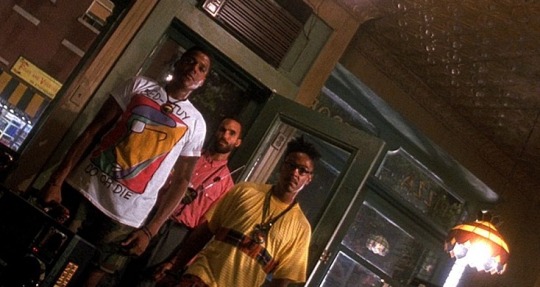
But it's also used a great deal in horror as a way to say: yup, shit just got real. Scary real.
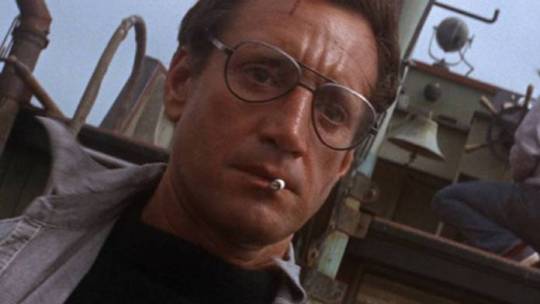
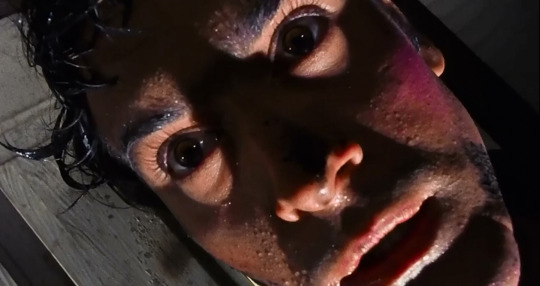
This Dutch angle introduces a character you may not appreciate at first, but absolutely should: Kazuma Kuwabara.

He's initially the comic relief and that's clear in his introduction. Within seconds we move from that intimidating arrival to, well, seeing him. To be clear, I've got nothing against redheads with big chins, but compared to Yusuke's design, Kuwabara is meant to be the funny looking one. His threat level plummets the moment we get a look at his face, especially in a series that will occasionally use looks as a (supposed) measure of intelligence.
Also, Kuwabara is dressed in light blue so, like Yusuke, we know he's important!
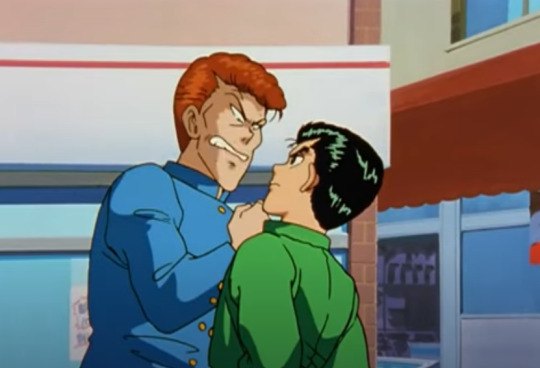
Any assumptions that his appearance isn’t meant to imply a goofy, embarrassing personality are put to rest when Kuwabara starts rambling about how they last time they fought Yusuke just got a cheap shot in and he'll definitely win this time. Yeah, he won't. Yusuke is thrilled by this diversion though and we get a shot of him looking almost as creepy as Keiko's friends think he is. Whatever else might be said about Yusuke, he is absolutely a monster in a fight.

Which we see here. If anyone picked up the series without knowing this was a fighting anime, they'll realize it now. Yusuke's choreography is stylized to show off his skill: he disappears with a 'whoosh' and dark lines to suggest inhuman speed,
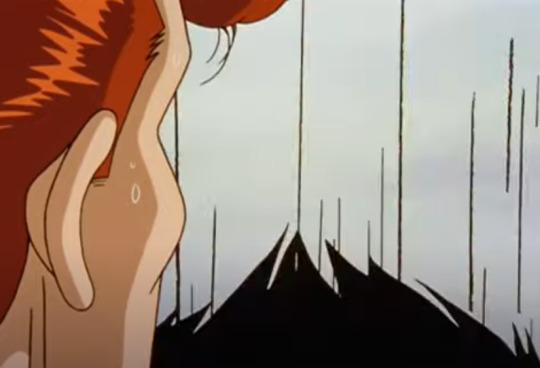
attacking Kuwabara with a knee to the face, utilizes flying kicks, lands perfect, precision punches, and ends it all with the toe-tip landing we've come to expect of all powerful fighters. Kuwabara never even got a hit in.
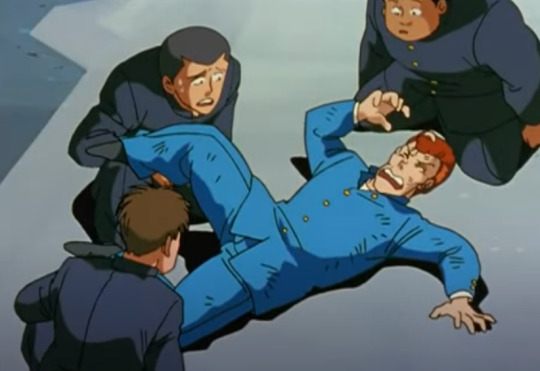
Happy as a clam now, Yusuke wanders off whistling and Kuwabara's friends are left to pick up the pieces. AKA, his likely broken bones. I love that they're legit friends though and not just nameless goons for the sake of giving Kuwabara a small gang (though their names won't come up until later). "That makes 0 wins an 156 loses!" one of them cries, trying to get Kuwabara to stop ending up in the hospital, probably. We establish that Kuwabara is The Most Dramatic Ever when he pulls his broken body into a seated position, shouting, "No! I almost had him that time!"
Then he passes out.
Kuwabara, honey, you obviously did not almost have him, but god bless you for the outlook. The most optimistic thing on this Earth is a well-loved Golden Retriever, but Kuwabara comes in at a very close second.
With his dream to one day beat Yusuke in combat established, we cut to Yusuke wandering the street where the episode opened. "Okay, I'm remembering" he says in a voiceover. "After that I met the kid."
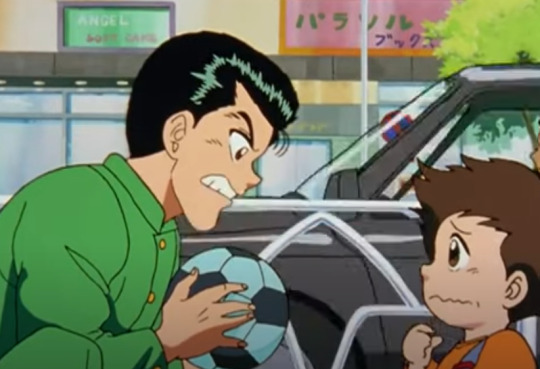
The soccer ball reappears as it rolls to a stop at Yusuke's feet. He grabs it and immediately starts yelling at the kid. Horrible protagonist, right? Well, Yusuke is trying to instill in him the danger of using this street as a playground, a worry the viewer already knows is 100% justified. “Listen, kid, that’s dangerous! There are cars going by that will splatter you into the pavement!” It's one of those quick moments where we get to enjoy Yusuke's duality: he's someone who is nearly making a toddler cry, but for rather understandable reasons. He's got the right idea, but needs to go about it in a more mature manner.
Which is precisely what he attempts to do. Sort of. Yusuke changes gears, though whether it's a more "mature" route is certainly up for debate lol. He tries entertaining the kid instead, raising and lowering the soccer ball to reveal goofy faces.
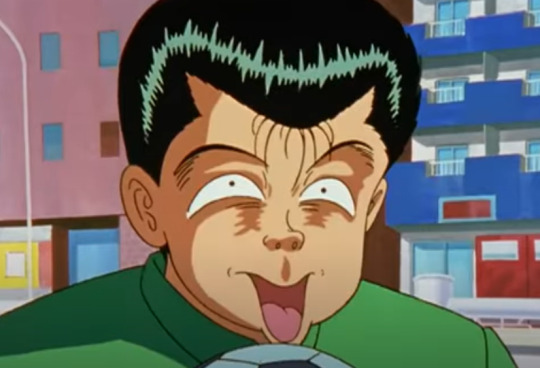
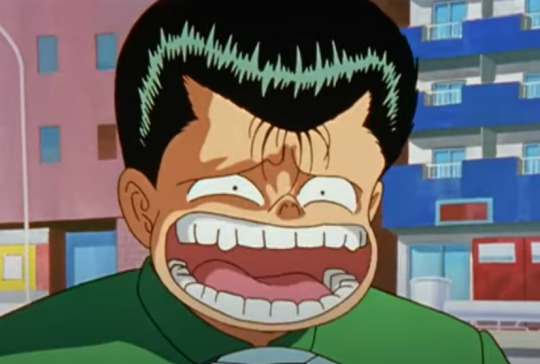
When these fail to impress, Yusuke goes full out by stuffing the ball into his pants, pushing his nose up with a pair of chopsticks he got from god knows where, and generally just putting on a display.
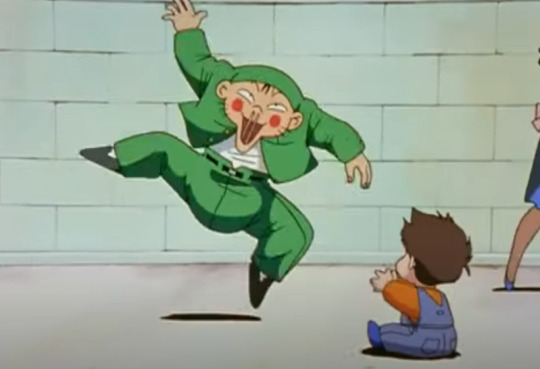
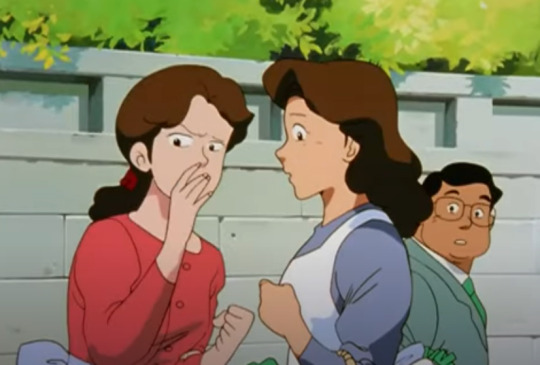
So Yusuke cares very deeply about his reputation... but only when it comes to those who are an established part of his life. Keiko, Mr. Takenaka, and the other kids at school all need to maintain a particular image of Yusuke, one that he's carefully cultivated. But random pedestrians on the street? Who cares about them? Let them talk.
This shows us that Yusuke does indeed have priorities over his own, selfish goals. Namely, the happiness of some kid is more important to him than looking "cool" for a bunch of strangers. Lots of characters with Yusuke's surface attitude would sneer at the idea of degrading themselves for — their words — some brat. But Yusuke, as we constantly see, actually does have that heart of gold. “Well, if all else fails I can still make kids happy.”
Although... I'm not sure what to make of his display itself. I have the distinct sense that there's something prejudiced here that I'm not able to fully articulate, what with the chopsticks, slanted eyes, bald head, and the like, though to be entirely frank I don't have enough knowledge of Japan's history to say precisely what it might be. Or, really, whether it exists at all. Just something to chew on.
What I am sure about though is the importance of having the child label Yusuke as monster — "Yeah, monster! — but in a delighted manner. Yusuke is indeed some kind a monster, someone who disappoints adults and terrifies his classmates, a demon fighter on the streets too, but here that identity is reworked into something positive.
Having successful secured a laugh, Yusuke tells the kid — calmly this time — to go play elsewhere. The toddler stares up at him with the blank expression only kids can manage.
Well, kids and whatever headspace I'm in after writing these metas.
To absolutely no one's surprise except Yusuke's, the kid does not go elsewhere. Instead, he continues kicking the ball down the street, causing Yusuke to exclaim, “Dammit, what’s the use? The kid can get smashed by a car for all I care!” Liar, liar.
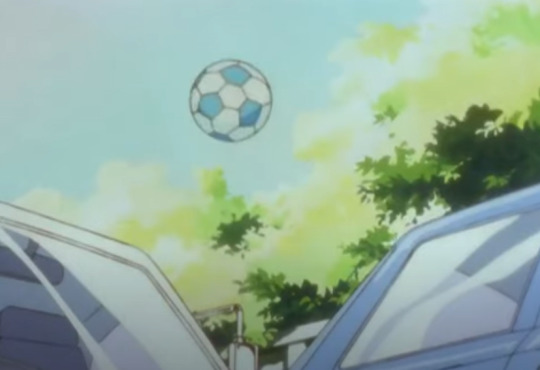
The picture becomes desaturated as the kid kicks the ball and it flies into the street, time slowing down to show it landing precisely in the middle of the road. Yusuke again yells for him to stay put, but when has a toddler ever listened? He begins to walk into the road as our driver arrives, speeding, swerving, and paying more attention to the girl at his side than what's in front of him.
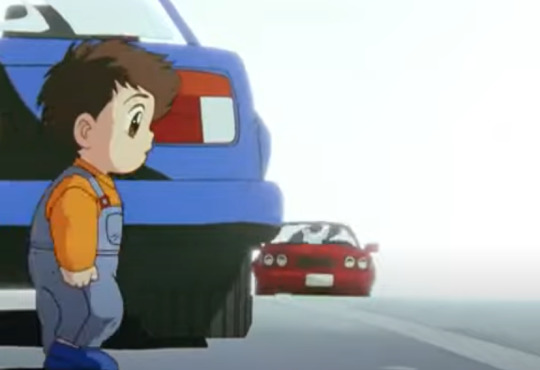
This time, we see the accident from the front with both Yusuke and the kid presented equally.
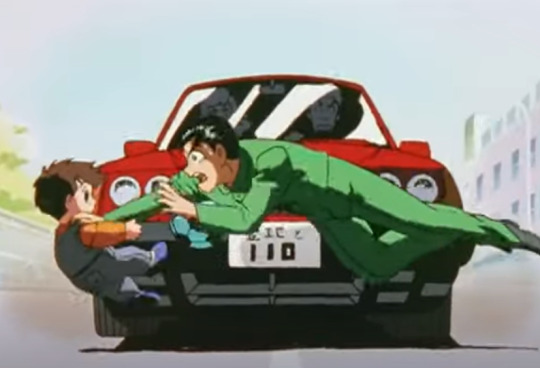
There's a cut to black and when we return we're in the present, Yusuke floating above the policemen now investigating the scene. “So that’s it? I’m roadkill?” As Yusuke realizes he's dead, specifically that he's a ghost, a voice goes,
"Bingo! Bingo! You win the prize!"
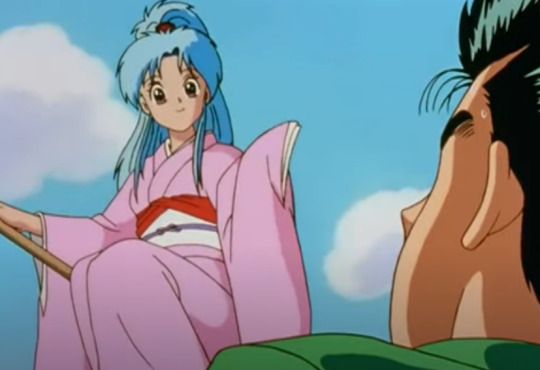
A woman has appeared who is quite obviously othered by the standards of the episode so far. Unlike the greens, blues, and browns of the series' modern clothes, she's dressed in hot pink kimono with blue hair to match. She's also, you know, floating on an oar.
“I didn’t expect you to figure it out so quickly," she says, referring to Yusuke's revelation that he's dead. Apparently, those who meet unexpected and/or violent ends tend to take some time coming to terms with their demise. It's a nice acknowledgment of Yusuke's intelligence in an interaction that's otherwise... not great for his self-esteem.
Meaning, this woman is about to drag him lol.
She introduces herself as Botan, pilot of the River Styx and guider of souls to the afterlife. You might also know her as the Grim Reaper.
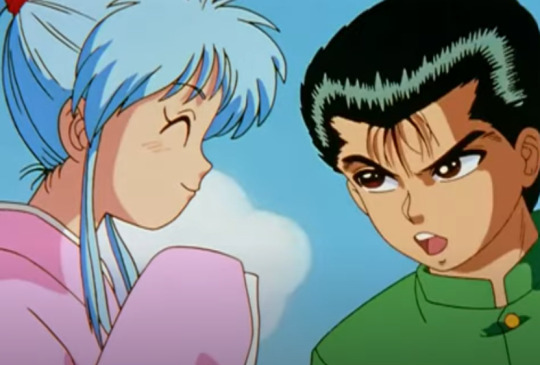
(Hey, RWBY fans: I originally wrote that as Grimm Reaper 🤦♀️)
It's an claim Yusuke takes issue with because 1. Botan is too pretty to be the Grim Reaper and 2. If she was really some god of death she'd be taking this much more seriously, not laughing and saying, "Bingo!" For the audience this does two things. First, it acknowledges our own expectations and validates them. Yusuke's world isn't so far removed from our own that he takes Botan's looks and personality at face value, he also expected a skeleton with a scythe. So don't worry, all the weird stuff in this series is weird to our protagonist too. They'll be explanations. Or, even if there’s not, you’re not wrong for being surprised.
Second, it sets up the very common theme in YYH of undermining those common assumptions again and again and again. We've already seen it with Yusuke, wherein characters who look and act a certain way are, supposedly, destined to be that person and nothing more. Yusuke is meant to be just a "weed," a dumb, violent, angry loser who goes nowhere in life... but we already know he's more than that. Botan is supposed to be scary and serious, but she says nah, I want to be cute and bubbly instead. No character in YYH embodies who they're "supposed" to be when you look past those surface characterizations. They play the part of archetypes — and do keep certain parts of their expected personalities — but they're also far more well-rounded than that. Which yeah, is something most people expect from any story nowadays, but YYH is particularly adept at making you think you're watching Simple Show A only to turn around and surprise you with More Complex Show B.
It's great, trust me.
So Yusuke is pissed that Botan isn't adhering to those expectations, in the same way that he works hard to validate others expectations of him. He doesn't know how to deal with someone challenging his world view yet. Rather than angering Botan though, she just nods and says that this response makes sense for him. “Rather than being scared, or surprised, you yell a lot and tell me I don’t know what I’m talking about." Taking out a notebook, she quickly summarizes everything we learned in the flashback — minus Yusuke's complexities: he's fourteen, in middle school, is ill-tempered, violent, hates authority, and is a horrible student.
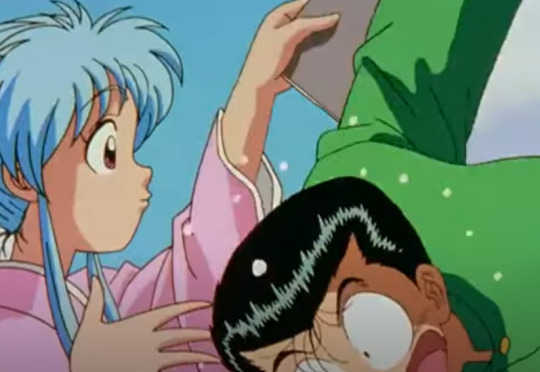
Typically, Yusuke responds by getting angry and trying to snatch the booklet out of her hands, only for Botan to pull it out of his reach, laughing. The tables have turned! Rather than being surrounded by people who cower at Yusuke's imposed authority, he now finds himself faced with someone who laughs at his transparent attempts to take control of the situation.
Calming down, Yusuke wants to know if the kid he saved is really alright and Botan offers to let him see for himself. That offer produces Yusuke's first, genuine smile.

They fly to the hospital where a doctor is in the process of giving the kid a clean bill of health, his mother crying with relief.
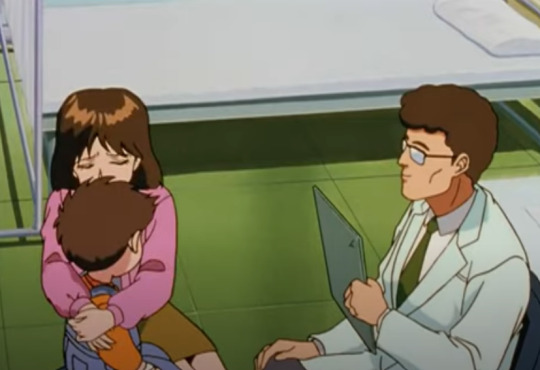
That's enough for Yusuke. “Alright, Botan, I’ve got no regrets, so you can take me to hell or wherever it is I’m going.”
That tells you all you need to know about Yusuke's self-worth, despite his bad boy attitude. His life is a dead-end as far as he can see and most of those around him haven't done anything to dissuade him of that idea. He says he doesn't care if the kid lives or dies, but then instinctively saves him. Post his death, Yusuke doesn't have anything he considers a regret, or anything he'd like to do before he leaves, like saying goodbye to a loved one. Oh, he's also pretty sure he's going to hell and has resigned himself to that without a fight.
Uplifting!
Botan just laughs though, saying that she's actually here to offer Yusuke an "ordeal" that could bring him back to life. See, he wasn't supposed to die today — let alone die saving a kid — and frankly they don't know what to do with him. It's another neat summary of what we've already learned: Yusuke is a far more complicated case than the afterlife assumed and now, when push comes to shove, deciding whether he belongs in heaven or hell is... muddled.
There's a fantastic story there about the problems with an afterlife that reduces a person's entire life to a few surface characteristics recorded in a book, refusing to acknowledge the context of their situation, or their capacity for change. “Run someone with your credentials a thousand times and they never would have saved a kid like that." Except, of course, Yusuke did save him, so those "credentials" are suspect, to say the least. However, YYH is not a story that explores these issues. Instead, I recommend you watch this!
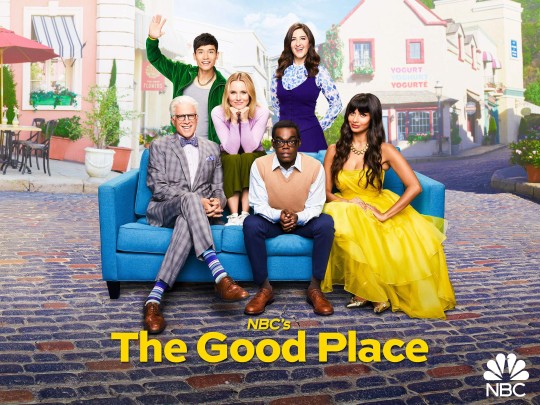
Rather than being upset at the afterlife's low opinion of him (because let's be real, Yusuke shares it), he latches onto a little detail Botan let slip. If he wasn't supposed to die today... then was the kid?
Mmm... no. Actually, without the chaos of Yusuke jumping into the road, the driver would have swerved at the last second and the kid would have not only lived, but actually come out with one less scrape.
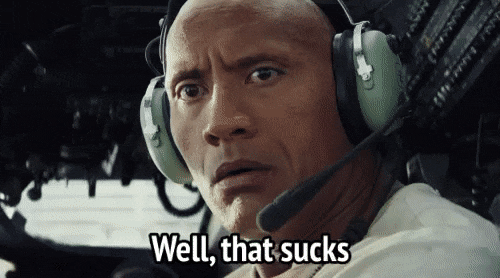
So Yusuke is obviously upset by this news! I would be too!! Holy shit, hang onto the "it's the thought that counts" message with everything you've got.
Also, don't think too much about the fact that the afterlife apparently knows exactly what will happen to people, down to how many cuts they accumulate in an accident. Also, don't think too much about where the afterlife foreseeing the crash begins and the unexpectedness of Yusuke interfering ends. That way lies madness. This will never come up again, so just let it go.
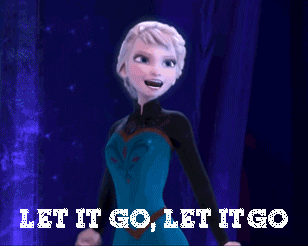
Sorry, 2013 me hijacked the post for a second.
As said, Yusuke is understandably upset by this revelation and as he fumes I'm reminded that this series likes to pull some amazing expressions.
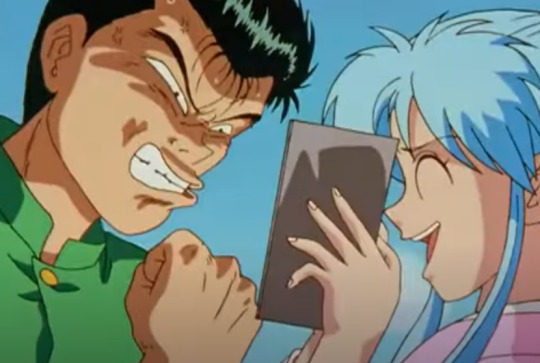
Botan reiterates that it's all fine because Yusuke can come back to life. Weren't you listening? He should feel honored, in fact, considering that an offer like this only arrives every 100 years or so. Well, that explains why all of humanity isn't grappling with people coming back to life on the daily. One person every generation isn't going to cause much of a stir.
However, instead of jumping at the chance Yusuke announces that Botan is just like the teachers at school: she doesn't know what she's talking about. “You said yourself my life was kind of pathetic, right?” he says, going on to explain that everyone will be happier now that he's dead. His school won't have to deal with his behavior, Keiko won't have to nag him, and his mom will be able to party whenever she wants. It's a win-win for everyone involved.
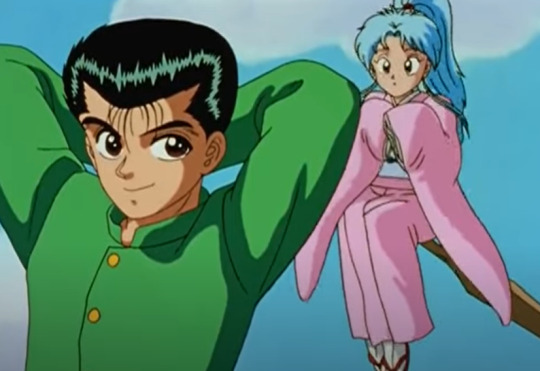
Hmm, this feels familiar.
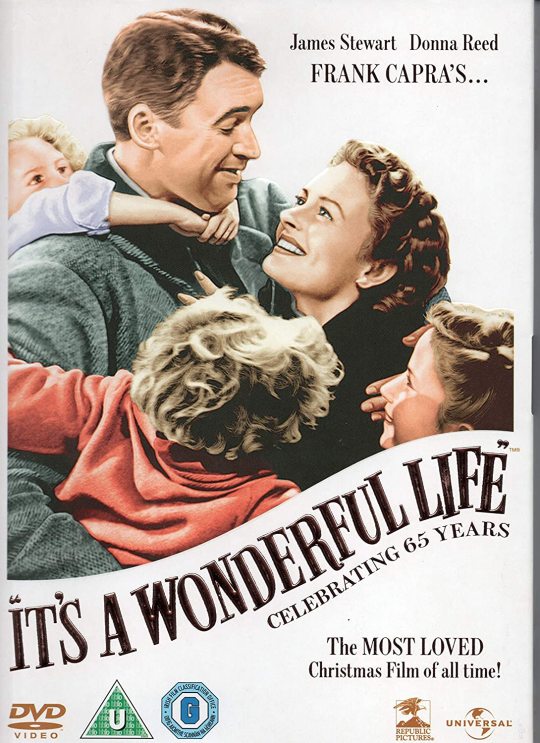
Don't worry, Yusuke doesn't need to experience a whole alternate reality to get the message.
“I’m sorry you feel that way at such an early age," Botan says and she is sorry, because despite her teasing nature that's a legitimately horrifying thing to believe. Yusuke won't budge though and after a little back-and-forth Botan leaves, telling Yusuke he should think it over while visiting his wake. She'll come back once he decides what to do.
“Do you have worms in your ears, lady? I did decide!” but Botan is long gone.
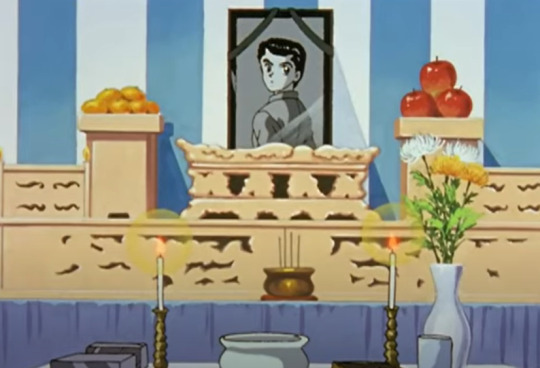
We cut to that night where Yusuke has indeed decided to attend his own wake. Maybe because of Botan's advice, maybe because he's just morbidly curious. We’re not given insight into the decision.
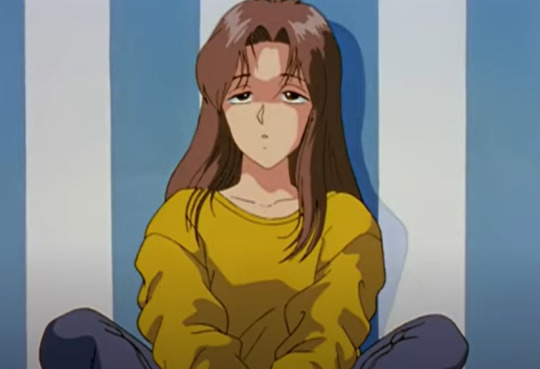
Atsuko is a mess, to put it mildly, not dressed for the occasion and sitting slumped against the way, staring vacantly as the guests offer their condolences. Yusuke is surprised by the fact that his entire class is here, but quickly writes them off when he sees two of the boys laughing. I'm on the fence about this detail, which I'll unpack in just a second.
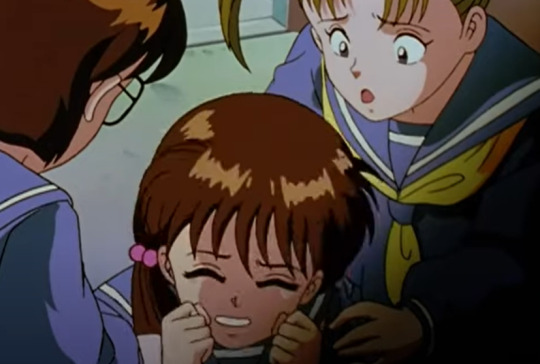
First though, Yusuke sees Keiko exiting the house, inconsolable in her grief. She collapses on the ground with her two friends trying to offer comfort, despite the fact that they had nothing good to say about Yusuke himself. Good on them.

Before he can think too long on this though, Yusuke is distracted by Kuwabara's arrival. Unlike Keiko's crying, he expresses his grief through yelling. Specifically, yelling at Yusuke. For dying. For daring to "run away." His own friends are physically holding him back as he charges into the wake, screaming, “Who am I gonna fight now, huh? Who am I gonna fight?" It's not really about the fighting, of course. At least, not the fighting alone. "You’re supposed to be here for me," Kuwabara finishes, the punch he's thrown at Yusuke's photo going limp and catching his first tear.
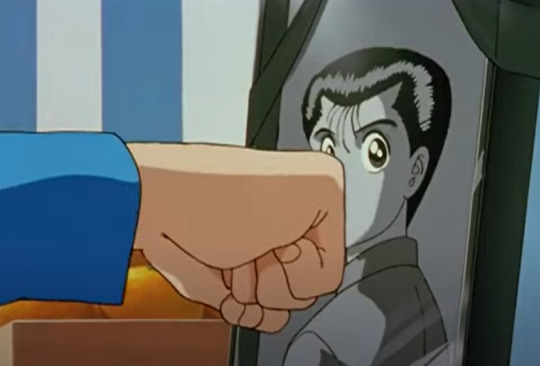
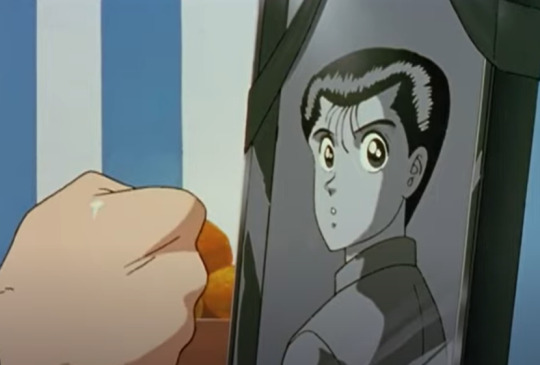
You know, for all the goofy expressions, this show really is gorgeous. Just wait until we get to the fight animations.
Kuwabara's reaction is why I hesitate to write off the classmates like Yusuke has. Granted, we have no reason to believe that they care for him as Kuwabara does — they're nameless background characters defined only by their terror of "the great Urameshi" — but it's still a split second taken out of context. We don't know what they were laughing at, or if laughing is a part of their grief. God knows I personally laugh at the most inappropriate moments. If you tell me someone has just died there is a very good chance I will laugh awkwardly as I try to process that. It’s just a reflex. All of which I bring up not because these side characters are important, but because Yusuke's perception of his own worth is. The point of each of these moments is to show that those around him have always cared for him, even if Yusuke didn't notice. It's nice to think that extends to his classmates too. The variety likewise exists to show us how people grieve differently, with Kuwabara's friends not understanding that this is how he's working through the trauma: “This place is for mourning!” He is mourning, even if his way of mourning isn't as socially acceptable as Keiko's. So if screaming and throwing punches is valid, crying is valid, staring stoically in a drunk stupor is valid... why not laughter too?
Not likely, perhaps, but possible.
As an additional possibility to chew on, watching this premier again, it struck me how more emotional Kuwabara's scene is compared to Keiko's. Don't get me wrong, crying and calling Yusuke’s name gets the point across, but it's two seconds of generic grief compared to a much longer scene rife with intensity. When Kuwabara arrives the music swells and everyone is forced to pay attention to him. His grief is loud, violent, and given symbolism with his fist and the photo. There's more effort put into his reaction, frankly, so it wouldn't surprise me if fans started shipping them after this. That grief combined with an "enemies to lovers" possibility is a pretty potent mix. To be clear, Yusuke/Keiko is the (oh so obvious) canonical endgame and in the fandom Yusuke/Kuwabara can't compare to another slash ship that will turn up later, but this is a good example of how writers can craft some Very Gay Scenes without realizing it. When you have the girl crying prettily for a second and the guy absolutely losing his mind over Yusuke's death, questioning his purpose now, his support network, and then collapsing in grief... don't be surprised if your audience goes, "Oh hey, maybe they'd be a good couple instead."
But I digress.
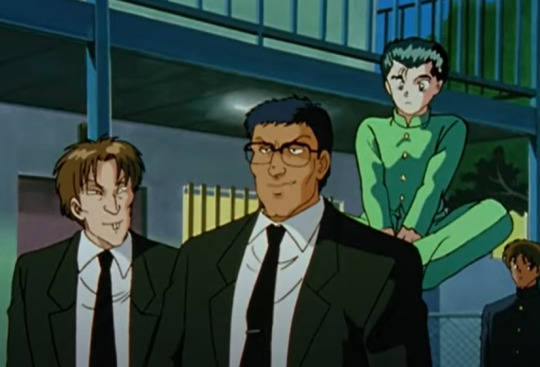
The only people who are unquestioningly happy about Yusuke's passing are Mr. Iwamoto and his co-conspirator, Mr. Akashi. You know Akashi is another bad guy because he has bucked teeth and "ugliness" is an easy way to code for evilness. YYH is not immune to those mistakes :/
These two are really something else though, standing in the middle of a wake and claiming it's “too bad that car wasn’t big enough for them too," referring to Kuwabara and his friends. Wow! What stellar members of the academic community. Iwamoto goes on to say that Yusuke dying at least accomplished something good. Not, mind you, saving the life of a child, but rather looking good for their school's reputation. Akashi agrees, but says it's likely Yusuke only accidentally saved him while trying to steal the kid's lunch money. Remember, that accusation of theft is the one thing Yusuke has said outright that he does not do.
He's pissed listening to all this — wouldn't you be? — but knows by now he can't do anything about it. In another fantastic shot, Yusuke hovers his hand over Iwamoto's shoulder, desperate to grab him, when Takenaka's arrives there instead.
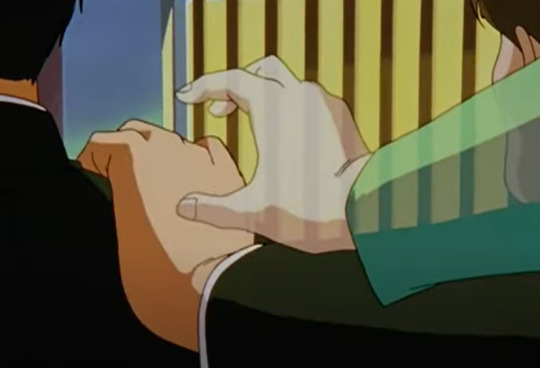
“What do you suppose is more disgraceful? That boy showing his misery, or your insensitive and idiotic words!”
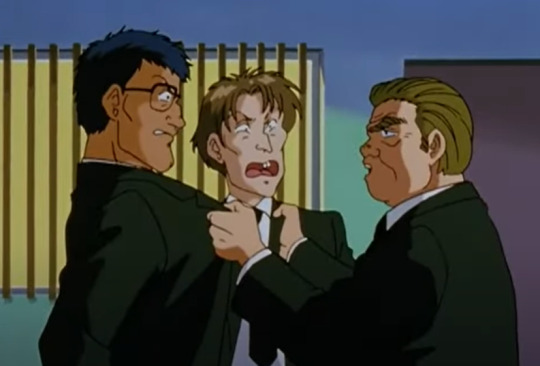
HELL YEAH. You tell 'em, Mr. Takenaka.
Yusuke gets his third shock of the night at this passionate defense. Takenaka leaves the teachers to go pay his respects, but admits to Yusuke's picture that he just can't speak well of him. He was surprised to hear that Yusuke gave up his life for another and it's a fact that he acted selfishly. Though he doesn't say it in as many words, Takenaka explains that he's not grieving because Yusuke was a good person, but because it's so clear to him that he might have been. “Why didn’t you stay? You could have made something great out of yourself.”
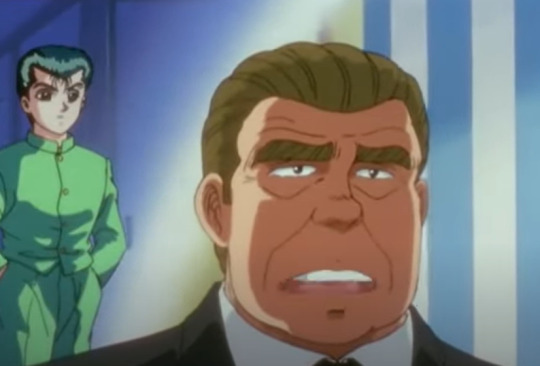
Normally, "Why didn't you stay?" is just something for the living to grapple with, as the dead obviously don't have any say in what happens to them. But Yusuke does. It's here that the lighting grows soft again and Yusuke considers Takenaka's words. Keiko and Kuwabara grieve for who he was, but Takenaka grieves for who Yusuke could have been — someone that might still exist if Yusuke decides to undergo this ordeal.
Atsuko adds fuel to the emotional fire, breaking down and hiding her face in her knees.
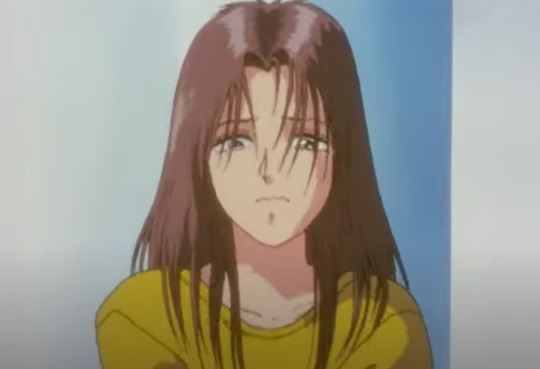

Finally, the kid Yusuke saved arrives with his mother. Because yes, Yusuke saved him in every way that matters, considering no one else knows — or will know — that he'd have lived anyway. I like that the show doesn't allow that knowledge to undermine the emotion of their arrival, or what Yusuke’s act meant to them.

The mom tells her son to pay his respects and the kid thanks Yusuke for saving him, and for "making faces." He clearly doesn't get what's going on here. This is confirmed as the two leave and he asks his mom if he can play with Yusuke again tomorrow. “I know some people sounded angry at him, but he’s really nice!"

They're probably just crying because they want to play with him too, he thinks, which just makes his mom join in. Everyone is crying in this club tonight.
Those words are the cincher for Yusuke and with a brief montage of all the grief he's witnessed, he makes his decision.
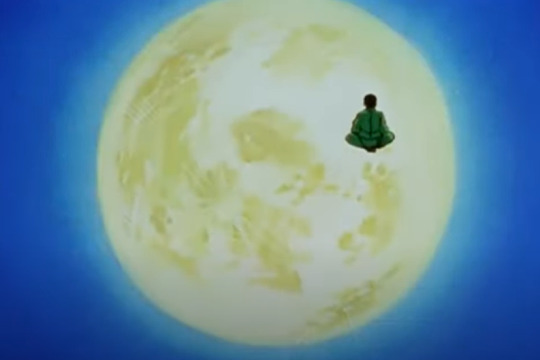
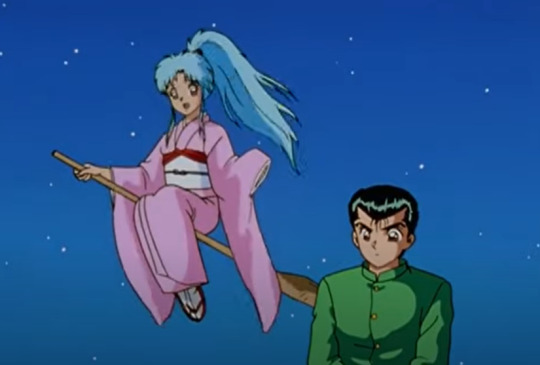
We cut to later that night where Yusuke floats above the city, admiring the moon. Botan reappears and he asks, “Have you ever not known about something that seemed obvious to everyone else?” Yes, everyone has experienced that at one point or another. She asks if he's made his decision and Yusuke agrees to try and come back to life.

Emotional revelations out of the way, we're allowed another tone shift as Botan yells with joy, speeding off and causing Yusuke to grab hold of the end of her oar, lest he be left behind. Cranky as always, he demands to know where they're going. "To the spirit world, of course!" They're off to see someone who can explain the ordeal and give Yusuke the tool needed to complete it. Just hang on and enjoy the ride.
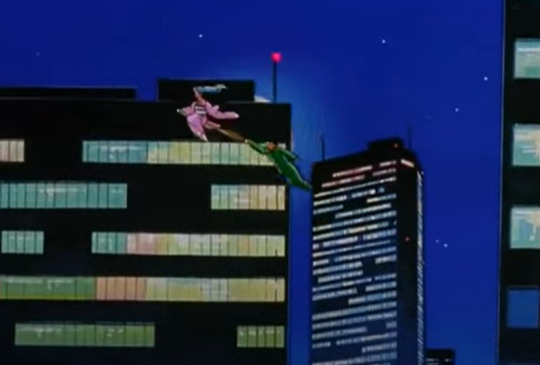
Thus ends our very first episode! Ah, the nostalgia. This is part one of a four arc series, with the anime cutting out a lot of the filler stories found at the start of the manga — a smart decision, I think. They primarily do the work of teaching Yusuke what he learned at the wake, so if you can accomplish that as quickly as the adaptation did, all the better. Especially since Yusuke needs to grow a great deal beyond the basic understanding that people might, sort of care for him, and that work will occur primarily through a job he's going to take on. The series isn't really about his death and it's not about an attempt to come back either — it's about what happens once you get that second chance. So this is the setup, but it's important setup all the same.
No need to skip ahead though. I've blathered enough for one recap. I hope you enjoyed and I'll see you when the writing gods next bless me with energy! 💜
45 notes
·
View notes
Note
I keep seeing post saying how radfem are bad, but I can't exactly grasp and remember /why/ exactly and what are their believes making them bad. I know TERF and SWERF comes from them, so I have maybe a vague idea, but I just can't seem to get it fully and I would prefer being able to caught on post that have their rhetoric. Sorry if this is something you already explain before, just ignore it if you dont wanna answer
This is a very long and complex question with a long and complex answer, and unfortunately I don’t have a lot of spare time or energy these days, but I’ll try to make this concise. It’ll be skipping over a lot, so don’t view it as comprehensive or anything, but I’ll do my best.
Basically, a lot of radical feminist ideas seem perfectly worthwhile on the surface, because, well, they come from feminism as a whole. Women are oppressed as a class under a systemic, pervasive, and diverse set of cultural and societal patterns broadly labelled as patriarchy. Seems reasonable, yeah?
Well, the question comes down to “where does patriarchy come from, how is it perpetuated, and how do we dismantle it?” The truth is, there are a lot of answers to this question, none of them easy, and it varies across time and space and even within communities.
Radical feminism, however, have a tendency to erase these nuances and look for approaches which can be applied across the board. While there are radical feminists who delve more deeply into the nuance, as a whole within the movement it gets distilled into some very basic points:
1) There are essential differences, not only on a cultural level, but on a biological and ontological level, between male and female.
2) Males have found and will find ways to oppress, exploit, or abuse any and all of these differences in females
3) These methods of oppression, exploitation, and abuse can be found at all levels of human sociability and society
Again, on the surface this doesn’t seem that different from what other branches of feminism might be saying, and it’s easy to agree with it based on a simple observation of the world.
This is where things get complicated. Again, while some radical feminists do recognise the nuance of situations, the movement as a whole is one towards distillation, towards finding basic essentials. The problem is that it is very difficult to find basic essentials across all humankind, let alone across individual cultures, and the process of distillation tends to erase nuances that many individuals consider key to their self-definition and lives.
These key tenants taken from this “distillation,” for example, are then extrapolated into some of radical feminism’s most popular talking points:
1) how you feel about your gender is inconsequential compared to the lived reality of biological maleness or femaleness
2) all forms of sex work are exploitative, primarily in the form of males exploiting females, in part because it relies on males being in a position of economic power over females.
3) all forms of interaction between the sexes, including sexual activity itself, need to be deconstructed and freed of anything which supports patriarchal norms
4) all forms of female existence must be deconstructed and freed of anything which supports patriarchal norms.
There are others, of course, but again, I’m short on time and energy here.
But I’m sure you can see from the four points I’ve listed that this is where the distillation process of radical feminism begins to erase the lived realities of actual human beings. While it may seem all very neat and tidy in theory, human individuals are not nearly so neat and tidy, nor are the societies we build. This makes the above talking points not a basis for praxis, but rather the perfect recipe for killing nuance, erasing individuality, and denying non-conforming groups of their dignity and volition.
Talking point 1, for example, is where the TERF weed starts to grow. Talking point 2 is where the SWERF weed grows, and so on.
I hope that helps.
31 notes
·
View notes
Text
History as an academic discipline is quite a bit more scientific than I think people on tumblr are really interested in giving it credit for. I don’t want to diagnose the root cause of the problem too much, but I do think it’s quite intimately related to the way in which lots of folk on here are driving by emotional politics rather than ideological politics — which is to say, people feel that something should be the case, and therefore believe X, Y, or Z, rather than people have a structural analysis of something, and therefore believe X, Y, or Z. This goes hand in hand with the rise of popular individualism in the anglo west in the late 70s, early 80s (see Emily Robinson et al.) and the various associates political/cultural elements therein. I won’t say more here, but this is a lot of what my research is on, So I do have thoughts.
Anyways — history is a far more scientific discipline than people are really ready to accept on here. When you go through training as a historian, you’re trained in a variety of methodologies and historiographical philosophies, and a lot of them sit in tension or contradiction with one another. However, even the most hardline subjectivists (like EH Carr, for example) would agree with this premise: historiographical narratives cannot be disproved on sentiment alone. They can only be disproved with sufficient research or reinterpretation of extant evidence. They cannot be disproved simply because they don’t feel right.
What that means — and this is an emotionally and politically complex reality of the field, please don’t assume that I’m endorsing it — is that as historians, we have to accept certain things as historical fact, even if we don’t necessarily agree with them morally or politically. For an example from my field, I think it’s incredibly gender essentialist and degrading to assert that ‘women tend to tell more emotive life histories and men tend to tell more event-oriented life histories.’ But the existing research says that this is true. In my research, I’ve worked to overturn this orthodoxy by uncovering new evidence of women who don’t tell emotive life histories and instead choose event-oriented narrative structures. I have also reinterpreted existing evidence to argue that the initial conclusions are wrong. However, given that my research has not yet stood up to peer review, nor has it been published, I have to accept that the state of historiographical play says that the above statement is true. I feel as if that’s wrong, but insofar as proving that it’s wrong goes, I haven’t met the criteria yet. I intend to, but I’m not there yet.
This is fine, this process doesn’t cause problems for trained historians, for archivists, museologists, etc. The problems arise when laypeople — particularly laypeople on social media — misinterpret how and why this process of knowledge production exists the way it does, and through that misinterpretation extrapolate information that they should not reasonably be extrapolating to draw illogical conclusions. To continue the example of my research, it would not be unsurprising to see people on tumblr call me a gender essentialist for accepting that historiographical premise in my work. It would not matter that politically I am not a gender essentialist, nor would it matter that my work seeks to problematise that gender essentialism, the very fact of my beginning with a widely-accepted (if politically and historically incorrect!) premise for my research would be enough to earn the GE label. You see this frequently with the generalisations that history as a discipline is homophobic, that historians are all colonisers, or that historical work is inherently misogynistic. The problem here is that it erases and complicates the work of historians who are trying to unsettle those norms — and the historians who are not homophobic, imperialist, or misogynistic and who are not working to unsettle those norms, but whose work nonetheless remains valid and important.
We, as historians, cannot problematise every bit of knowledge at all moments. The orthodoxy has to be chipped away bit by bit. I’m not going to say that it isn’t frustrating, tiring, or even (tbh) dehumanising, but it’s the state of the state in academia. But that we are forced to work within these incredibly tight parameters does not make us morally or politically illegitimate; if there is a way to secure a revolution in the academy that has not yet been tried, I would welcome advice on it. Such as it is, reform is the only plausible path forward (in the academy!!! Not generally!!!).
When people on tumblr, typically people who are not aware of how the historiographical process works, pontificate about historians writ large being homophobic/misogynistic/racist/whatever, they are actively damaging the historians who most need to be heard. The pale, male, and stale bourgeois academics aren’t hurt by those accusations, because they simply don’t give a fuck. Historians like me, however, queer, disabled, nb historians (for just one case), are hurt by those accusations. It functions as a delegitimisation of the research that I do, of the serious and credible political work I am undertaking both as a researcher and as an activist, and it encourages me to give up on this small corner of a wider struggle. If historians like me — or indeed historians not like me, but who do not fit the bourgeois academic mould — are chased out of the academy, you will not have succeeded in making history more accurate, more diverse, or more politically correct in its analyses. You will have, essentially, ceded the ground to the regressive orthodoxy. And for whatever criticisms I have of tumblr’s liberalism and general detachment from practical politics (go touch some fuckin’ grass guys!), I do not actually believe that you’re trying to undermine the effort to decolonise and democratise knowledge. I think a lot of you are being incredibly unhelpful and even very damaging, but I think it stems from ignorance, not malice.
Anyways, it’s really late, I’m very tired, I’ve had an incredibly difficult day dealing with people (historians! yes! bad women historians!) who promote rank misogyny in their obsession with emotive politics above serious politics, so I’ll do everyone a favour and stop talking and go to bed. But I do really wish people would approach this stuff with more sensitivity and respect than they do right now. Ugh. Okay. Night.
6 notes
·
View notes
Text
Why everyone needs to stop what they’re doing right now and watch Gargoyles...
1994 blessed us with a rare gem of television: Gargoyles. It had the perfect blend of good story telling, character development, cultural representation, mythology, fantasy, action, romance, and timeless themes. It has stood the test of time. At the very heart of the story is a message that I feel everyone in today’s cultural climate needs to hear and remember...
Forgiveness and compassion are the only way forward to peace and change.
For those of you who aren’t at all familiar with the story, I shall attempt to summarize the intricate plot. In 994 AD, a clan of gargoyles, stone by day and living beings by night, protect a castle in Scotland. When the castle and the gargoyles are betrayed and many of them killed, a spell is put on the survivors that puts them in an eternal sleep (broken only if their castle rises above the clouds).
Fast forward 1000 years. A wealthy owner of a multi-national organization hears of the legend and moves the castle and gargoyles stone by stone to the top of his Manhattan skyscraper. Come night, they revive for the first time in a millennia, finding themselves in a world much changed. Humans no longer believe that gargoyles ever lived, and they find themselves alone and disoriented.
The leader of the gargoyles, Goliath, soon meets an NYPD detective, by the name of Elisa Maza. Like all modern humans, her initial instinct upon seeing the monstrous creature is one of fear. She recoils from him, accidentally falling off the battlements of the castle. Naturally, he swoops down and saves her, then climbs back to the top with her clinging to his back (because gargoyles can’t fly, only glide). He tells her to trust him. She listens to his story and decides to befriend him, immediately resolving to teach him and his kind how to live in this modern world. Thus begins a wonderful relationship.
Gargoyles have one primary purpose in life - to protect their demesne from enemies by night. Goliath and the Manhattan protectorate soon learn that those who threaten the peace are not in the form of foreign invaders, but the very citizens of the city who refuse to abide by human law. They partner with Elisa to help control the crime in the city (ranging from scaring off would-be purse snatchers, to busting up protection rackets, and of course, battling the super villains who want nothing more than for all of humanity to be destroyed).
But everywhere they go, the people of the city treat them with fear and hatred - even the ones they help. With few exceptions, the gargoyles are viewed as monsters. Granted, the gargoyles have to keep a low profile due to their vulnerability during the day - so the humans don’t really know much about them. Even so, the ones who do get a chance to meet them tend to view them as nothing more than tools to be used or beasts that deserve eradication.
Goliath knows that humans fear what they do not understand. He acknowledges it and accepts it, but he never stops hoping and striving for a world where his race can live in harmony with humanity - as equals. No matter how many times he and his kind are betrayed, shunned, and mistreated, he forgives them and moves forward. Though occasionally tempted to vengeance when his family and loved ones are killed or attacked, reason always prevails over hatred. He never stops protecting them. He never stops valuing them. And because of his respect and eventual love for Elisa, he knows that humans are capable of understanding and accepting one such as he.
Elisa, for her part, is the ideal person to befriend a justice oriented race of beings. She is a cop, after all. She takes her oath “to serve and protect” very seriously. When she sees injustice, she won’t stop until it’s dealt with. She works within the confines of the law (but also tolerates the gargoyles bringing a heavy hand on criminals caught in the act).
Elisa is also uniquely able to see through to the heart of her strange friends because of her own background. Elisa’s mother is Nigerian and her father is a Native American. Her father was also a police sergeant. They forged a strong marriage, despite many ethnic and cultural differences, and raised their three children to see past appearances and stereotypes. When their son ends up having a drastic appearance change (thanks to the reckless experiments of a mad scientist), they quickly overcome their shock and accept him as he is.
Similarly, Elisa begins to fall in love with Goliath, despite the difference in their race. Just like many people on the show, some viewers see this relationship as problematic because it condones “bestiality” or “monster-f***ing”. If you can watch Gargoyles to the end and believe this - congratulations, you missed the point of the whole show (and you might struggle with racism). One, Goliath is not an animal, so bestiality is not an accurate descriptor. If Elisa had fallen in love with lovable gargoyle/dog Bronx - that would have been bestiality. Furthermore, Goliath is not a monster. He is an intelligence, deep-thinking, compassionate, forgiving, and honorable person. His outside appearance and unique culture is the only thing that separates him from other humans. Elisa sees that and accepts it, though she struggles with her feelings for him for a long time. She eventually decides that the obstacles to their relationship cannot stand up to the depth of their love, respect, devotion, and trust in each other.
Goliath has fewer reservations than she does, but I appreciate that the show made a point to reveal to us that Goliath did not find her attractive from the beginning. Her human form was not appealing to him and it wasn’t until she was temporarily transformed into a gargoyle that he noticed her beauty. In the same way that she saw past his looks to the heart of him, he also saw past her appearance to the heart of her. It was their love of people, their insatiable desire to protect, and their strong sense of justice that made them so compatible. Though both have their flaws, like all of us - they face their demons, take ownership of their failures, and extend grace to each other and their enemies.
I look around me today and listen to the words that people are saying to each other (particularly on this very website), and I wish that more people could be like these two. Instead of looking at the color of a person’s skin or the uniform they wear and making assumptions about their thoughts, beliefs, or character, we should all attempt to get to know people as individuals. I wish we would stop clinging to our self-assigned clan labels, whatever those may be (white, black, cop, civilian, privileged, minority, etc.). I wish we would realize that we are the same in all the ways that truly matter.
I wish we would look at the injustice around us and unite to stand against it - instead of creating more injustice by responding to crime with more crime, hate with more hate, racism with more racism, bigotry with more bigotry. I wish we would look at humanity and recognize that while racism and bigotry will always exist in the hearts of some, most people are eager to look past our differences and bond over what we have in common, if given half a chance. I wish we would learn to forgive the faults of others and acknowledge our own. I wish we would take more chances on people.
Violence, protests, vengeance, and anger will not move us to a place of unity. They have their place. Injustice should incite righteous anger. But we can’t dwell in a place of hatred and hurt. At some point, we must forgive and extend a hand to the people across from us. Relationships are the only way forward to peace and unity.
Many “white” people don’t understand the “black” community and vice versa. Many civilians don’t understand the police community. It’s so easy to look at evil people from both groups and extrapolate stereotypes to everyone in those groups. And that WILL NOT END until we stop generalizing and trying to dehumanize each other. Get to know some people who look different from you or live in another neighborhood as you. Get to know some of the men and women who took an oath to serve and protect everyone in their communities (like Elisa Maza) and decide if denying them their calling is the answer to our problems.
In Gargoyles, there are three races: Fey, humans, and gargoyles. Humanity is treated as one race. I think it’s high time we started thinking that way ourselves. Though humanity has great ethnic and cultural diversity, we are the same in all the ways that truly matter.
>>>>>>>>>>>>>>>>>>>>>>>>>>>>>>>>>>>>>>>>>>>>>>>>>>>>>>>>>>>>>>
Goliath: I still don't understand how Dracon could ever believe that you would turn to a life of crime.
Elisa Maza: I guess the corrupted are the first to believe that somebody else can be corrupted. And it's not impossible. None of us are perfect, that's why we need protection, even from ourselves sometimes.
Goliath: Then I will protect you, you will protect me, and together we will protect this city.
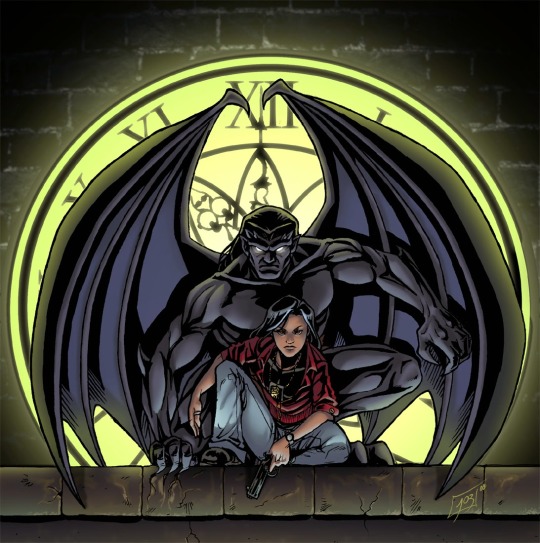
#gargoyles#racism#peace through unity#black lives matter#blue lives matter#gargoyle lives matter#sometimes a kids tv show from the 90's has more wisdom than half the people posting on tumblr#stop the violence#forgiveness#compassion#one race#the human race#stand up to injustice#if you are spreading hate you are part of the problem#if you dehumanize people who don't believe the same as you - you are part of the problem#love your enemies#do good to those who persecute you#treat others the way you want to be treated#be the change you want to see in the world
97 notes
·
View notes
Note
help, how do I write, well... armoured infantry fighting eachother? like, everyone's decked to the nines, so now I have the problem of gunfights devolving into brawls as people run through mags.
Treat armor much like how it works in real life - incredibly valuable for buying you a second chance, but not nearly so impervious that you can just stand around getting blasted. I presume you’re having a problem where you apply this metric and it makes modern-day style firefights where cover is king grind on forever, right? Well, you might be surprised to know that many real-life firefights actually do work that way. This is why “fire and maneuver” is such a key component in modern ranged combat, and why flanking is as important in the modern day as it was in rank-and-file melee combat of the ancient world. When both sides are in cover (and they will be since if they’re not in cover to begin with they’ll get there fast,) and playing peekaboo with each other, many rounds will be expended for relatively little effect. To do damage, you have to literally flank the enemy - if he’s hiding behind a rock, you have to move around to his side, so you’re shooting at him from two directions, so both sides of his rock are threatened.
Naturally, once your enemy is flanked in this fashion, they tend to retreat and regroup rather than stay in their compromised position and be swiftly annihilated. Compare this to B.H. Liddel Hart’s words, where he says that strategy “is not so much to seek battle as to seek a strategic situation so advantageous that if it does not of itself produce the decision, its continuation by a battle is sure to achieve this. In other words, dislocation is the aim of strategy...”
Liddel Hart was describing strategy, but his observations apply equally well to tactics, even squad-level tactics, in modern warfare. Which, in itself, neatly shows you why insurgencies are so hard to combat - infantrymen with rifles are superb tools - in truth, the ONLY tool - for taking and holding ground, but forcing an enemy off the ground you want to hold is a lot easier than actually pinning them down and eliminating them. Thus the goal of insurgencies is to not actually hold any ground of their own, but stay ephemeral.
Thus the integral relationship between fire and maneuver which you see military theorists constantly kicking around. All you need to keep in mind (a point said theorists often get too deep into the weeds to remember) is that applying firepower is the point of maneuver. You need 1. something to shoot and 2. a clear shot to your target in order to use it. If they’re in foxholes or a bunker, for example, that means getting close enough to use grenades.
So to apply power armor to a firefight, we have to consider how it affects fire and maneuver. Now in the history of war there has always been a fluid relationship between armor and firepower, one that often changed rapidly as technology changed. Sometimes it’s the pre-dreadnaught era, where even the biggest nutcracking guns afloat couldn’t penetrate the crucial spaces of opposing battleships, and sometimes it’s the 1940s era, where body armor is mostly an afterthought as no practicably wearable technology can really oppose the weapons in use. But more often it’s been Conquistador-era, where people check for the “bullet proof” dent in the armor that proves it can stop a musket ball - or for that matter, a (lighter) crossbow bolt - but know there’s no option to protect the face or limbs, because they’ve already used up their weight allotment on the armor protecting their torso.
One of the first things you have to decide about the technology in your story is, this relative relationship between offense and defense. Is one currently enjoying advantage over the other, or are they in a period where they’re relatively evenly matched?
From there, account for the effects of (what I assume is) power armor. Powered suits not only let you carry more armor, but also more powerful weapons to punch THROUGH the armor of your enemies. They also allow you to move a lot faster, over much rougher terrain, as the infantrymen are freed from the limits of human strength. This boost in mobility is doubled by the reduction of firepower. The basic technique of fire-and-maneuver is covering fire; you pour fire onto the enemy so they have to stay behind their cover and can’t light up your troops as they move. Thus the concept of “effective fire;” you need to put enough rounds on your enemies that they are actually forced to duck, or if they are moving, force them to stop advancing and hug cover. If armor is stronger, then it takes more fire to be effective. This benefits everyone, of course, but I’m going to wager it helps troopers trying to maneuver relatively more, as the ones behind cover already have very good protection. The armor mostly protects against blast-frag; i.e. shrapnel. (Shrapnel is the primary killer of infantrymen because it spreads the “love” around. This is why things like tanks were historically hard to kill with artillery or airpower; blast-fragmentation compensated for the innate inaccuracy of unguided munitions. You either needed direct fire [like the 37mm gunpods Stuka’s used, or yes, the GAU-8 decades later,) or ‘spread’ munitions that could kill tanks, like napalm or armor-piercing bomblets.) The precision-guided munitions revolution has largely negated many ordinance distinctions born of blast-frag primacy; pretty much any weapon, even ones fired out of a rifleman’s underbarrel grenade launcher, can be precision guided and home in on a single target; even a single power-armored infantryman. So while power armored infantry in the real world, right now, would be very tough to kill because most standard artillery rounds couldn’t root them out, in a futuristic setting we can presume that they’re dropping self-guiding submunitions with micro-sized armor piercing warheads. Thus the real beneficiaries, comparatively, would be the guys maneuvering - not only are they faster, but they’re primarily threatened by hostile small arms, and with better armor, the same amount of firepower threatens them less. Overall mobility on the battlefield would be enhanced.
That naturally leads to firefights happening at shorter ranges as both sides aggressively maneuver on each other, as neither sides fire will be effective at suppressing the other till they reach shorter ranges (mainly due to accuracy. The more rounds clustered tighter on target, the more likely they’re going to drop.) And both sides can reach close range faster. So fights will be shorter, faster, and more intense.
Remember - it doesn’t HAVE to be this way. You can approach this from a question of “what kind of dynamic do I WANT?” and then simply write the tech in the story to support that. Remember what I said earlier about the struggle between firepower and armor through history - it can change fast - so it’s entirely plausible for your story to be happening at any point on that spectrum. Those pre-dreads I mentioned? Only 40 years later, in WWII, firepower had caught up so drastically that the guns of a cruiser could punch clean through the belt armor of a battleship under 15,000 yards or so. But that was suicidally close for a cruiser... because of the battleship’s own guns. Again, fire and maneuver. Or firepower, maneuver and armor, if you want to make it a triangle; each one has both offensive and defensive applications. The shape of that triangle dictates the blend of them that will be used to conduct warfare and in what fashion. So if you don’t have a specific, desired combat dynamic in mind for the story, it’s also good (and fun) to nail down what that triangle looks like FIRST, and then extrapolate from there to discover what it’d be like. It all depends on your priorities as a storyteller.
A last note - everything I discussed above is an issue under serious consideration IRL as pertains to infantry. Body armor has gotten scary good, in the last few decades especially. The Army was first kicking around a 6.5mm round in the 90s and the topic is coming up for consideration more and more often, as well as alternatives like three round burst and such (remember the AN-94s clever super-fast doubletap? Ayep.) So you can read up on current IRL discussion on this topic to get ideas about how things might change and how armies will adapt.
My discord is Demetrious#5963 and I’m on Rizon under Demetrious as well; hit me up if you wanna talk more on specifics or whatever~
11 notes
·
View notes
Text
Assorted House of Feanor Thoughts
I wrote this as a reply to someone, but then realized that this should be a post of its own.
Line between extrapolation, interpretation & headcanon is going to be fluid here
Long post under cut
The seven sons in general:
all moody, fierce, intense and brilliant, each in various different ways
none of them can really stand to be cooped up in one place for long
F R E C K L E S you will not convince me otherwise
Apart from the ones explicitly described as pretty (ie, Maedhros and Celegorm) they’re actually relatively plain by elf standards, or at least sort of rugged-looking, especially compared to their part-Vanyar cousins - I mean, figures that some would turn out more like Miriel or Nerdanel both of which were supposedly more average.
all are very resourceful having spent most of their lives helping out with their parent’s projects, exploring the wilderness, or (save for Celegorm) hanging out in Aule’s halls. Most can probably whip up a steampunk or magitech solution to basic war-related problems
Because of this they’re a very tight-knit group
growing up, they did not know many children their age; Ironically the most contact they had was with their cousins because Feanor paid semi-regular visits to Finwe. Apart from Turgon (and Orodreth if you place him in the second rather than the third post-journey generation) the cousins really dug the adventure stories. (Galadriel pretended not to be interested and offered plenty of critiques, but listened anyways)
more survival skills and just a lot more casual than your average princes
They’d all been adults for a good while by the time of the rebellion; the twins are a tad older than Aredhel, Galadriel and Argon; Caranthir and Angrod are about the same age. Curufin is younger than Aegnor.
They all look back at that trip to the lightless shore of the outer sea as a cherished family memory
Also I don’t think Feanor disciplined his sons very much after all his own father let him get away with everything. In his eyes the brats can do no wrong especially not Curufin and to a lesser extent Amrod Nerdanel tried her best to counterbalance this and it kind of worked on some of them, but the three middle ones were a lost cause
I think a lot of the weight behind the oath comes from how Feanor made them promise him to see it through on his deathbed. It was his literal last wish.
Maedhros:
The Leader™, the most strong-willed and the deadliest fighter by a huge margin. What the orc under your bed has nightmares about.
Obviously a very competent diplomat, strategist, and the sort to put constructive results over personal glory; resilient, formidable, unpretentious and tough as leather
but not at all overconfident, and the type who is not blind to the flaws of the people he loves. He knows very well that Feanor wasn’t perfect and does many things that his father would not have agreed with - at the same time he has a strong sense of obligation, honor and loyalty which turns out to be his fatal flaw in the end when being loyal and keeping his word increasingly requires him to do dishonorable things
if there was a definite breaking point it was the fiasco with Dior’s sons
Stoic but courteous and eloquent; From Finwe’s death onwards increasingly grim, grizzled and not very hopeful, though he’s the sort to give his all and try to be noble even when there’s no reward or even thanks or respect.
Despite this, he has as a dry sense of humor and at times uses it to defuse tense situations or disarm people he’s negotiating with (see the scene with Thingol’s message) - does have a streak of gallows humor to him especially after the Thangorodrim incident
As the heir Feanor actually let him in on trade secrets and scientific speculation; Their relationship is probably the most equal; I do think Feanor was capable of actually appreciating that Maedhros got a mind of his own and isn’t afraid to stand up for himself. Feanor values independent thought, even if he’s not always good at really living that value with his tendency to take things personally and see others as taking sides for or against him.
Can’t really craft stuff to the same degree without his right hand. He then focussed on more abstract/mental pursuits which were perhaps his forte, to begin with but it still bothers him more than he lets on, especially since he still retains, or swiftly regained, his skill at making things dead.
He may or may not qualify as a cinnamon roll but he definitely looks like could kill you
Maglor:
Maedhros might have been the token responsible sibling, but Maglor was the understanding, comforting one and always had a nurturing streak - hence why he was the one to take in the kids.
Sensitive Artistic Type™ - goes from quirky and passionate back in Valinor to melancholy & tormented as the war drags on
one of those people who despair over & get self-critical over their work even when it’s regarded as masterpieces
Like Feanor and Miriel before him, he tends to get super absorbed in his work/art and just plain disappears for days
Now some ppl hold that he didn’t start having second thoughts until near the end, but judging from how he comes along to Fingolfin’s party or to hang out with Finrod, I’d hold that he was always ‘the nice/gentle one’, but not solely in a positive way; Unlike Maedhros he did not stand up to Feanor about the thing with the ships and indeed lets Maedhros talk him out of turning himself in at the very end, so he’s probably somewhat lacking in assertiveness
Even so, he’s probably one of the better fighters, given the difficult territory he gets, that he’s the one to kill Ulfang, and how long he survives. He probably feels ambivalent about this.
I imagine him having an agility-based fighting style
Probably codified the heroic epos as a specifically Noldorin art form
Celegorm:
A lot of ppl focus on the barbarian aspect, but I’d say he actually has some degree of ‘subverted prince charming’ going on, with how he sweet-talks Luthien at first before throwing her in the dungeon, and how he seems to have been one of the more accomplished ones, joining a respected order and all
He’s actually pretty elegant and perhaps playfully gallant, but it’s a facade; He’s an animal underneath; though his instincts are probably somewhat nobler than what ends up happening when he gets roped into Curufin’s schemes
usually, the first to react and leap into action when something happens.
Herculean strength, daunting presence
also a fairly efficient general, if a bit of a glory hound and pretty fearless in the pursuit of victory
very much has an ego and doesn’t like being humbled at all
Strikes me as the sort of person who would take badly to the realization that they can no longer return to the glory of the past or being judged unworthy, not that he’d respond with anything but defiance
Wrestles giant monsters barehanded
Always low-key wished to fight creatures of darkness before the rebellion to test his might against them; Orome and the Maiar members of the hunt would have told stories of them
though he gets his pretty face from Daddy, his strong build comes from Nerdanel, possibly somewhat accentuated by his being a dude
Caranthir:
grumpy, moody, no filter, likes his alone time, shows his feelings mostly through actions, also somewhat pragmatic
the quartermaster; Actually one of the smarter ones, if not outright the second smartest after Curufin, though he has more a logistic/administrative sort of intelligence
generally one of the more prosaic, practical family members, or maybe he’s just more subtle about his dramatic side or has a harder time expressing it. Definitely has Hidden Dephts™
I mean, putting your hideout on the slope of a mountain near a deep, dark lake circled by mountains? Goth AF. A+ aesthetic there.
Hosts the family get-togethers at his fortress. Has most certainly shoved Celegorm and Curufin in the lake at some point
has a certain respect for strength, valor and skill even in ppl he doesn’t necessarily like; Not at all diplomatic or polite, but also not finicky or fastidious, so actually forged a whole lot of alliances on a “everyone’s money/swords are equally good and we don’t have to set conditions” basis and seems to have been pretty successful at this
started out haughty but definitely learned to be more open-minded/ broaden his horizon over his time in Beleriand - but as no good deed goes unpunished, Ulfang happens
Whereas Curufin and Celegorm can put up a noble veneer but will totally stab you in the back if provoked, Caranthir’s sort of the opposite, in that he’s rude and quarrelsome on first contact but has a good heart deep down (see the Haladin incident) and doesn’t keep grudges long term once he’s done grumbling where Celegorm is sore loser and Curufin a spiteful twerp.
though personally, I don’t see Caranthir as trying to reign himself in. He wouldn’t really be known as “the harshest” in that case. Who was gonna teach him to behave himself, Feanor maybe? kek.
Curufin:
We have a lot of actual dialogue & description for him - he has this characteristic little defiant smile, is often coldly contemptuous in tone, some level of ruthless pragmatism
has mild/vague foresight - nothing as impressive as what Finrod and Galadriel have, but he has it more or less to the degree that Feanor did.
actually pretty insightful, thought-through and political-minded in some ways, too bad he shares Feanor’s tendency for unwarranted suspicion and factionalism, as well as a tendency to just act on his own without checking with anyone
always either filthy from work or fully blinged-out and impeccably groomed, no in-between
more calculated and subtle than Feanor - not that Feanor ever needed calculation or subtlety since he could get by on sheer awe or intimidation. Celegorm and Maedhros have that same quality in spades and Curufin’s a little bit jealous
Not actually that much older than the twins, but always acted older than his age, especially once he heard that Feanor was the same
collects weapons, loves fancy horses, the most traditionally aristocratic of the seven
Got married relatively young; saw it as a matter of honor to further his family’s line
continued his scholarly pursuits in Beleriand; this is part of why he elected to share a territory with Celegorm
The last Celebrimbor ever heard of him was a magically sealed box filled with research notes he sent out in case he didn’t make it out alive
Did not take his parents’ estrangement well and is stubbornly salty toward Nerdanel (though deep down he misses her as much as his brothers if not more)
Frequently the Bad Influence/ Shoulder Devil to his brothers.
But when he gets excited about his research/craft he’s got this “exited cocky little boy” side to him that’s surprisingly pure.
Only Nerdanel and possibly Celebrimbor’s mom are allowed to call him ‘Atarinke.’ His brothers might still use it when they’re teasing or scolding him.
The Twins:
Every time a fic does something else with them than “generic prankster redheads” I cry with joy
We don’t have that many data points on them, but most of them suggest they’re every bit as fierce as their brothers
they’re somewhat aloof & mostly do their own thing;
As kids they’d mostly sit in a corner and play with each other. Possibly deliberately played up their identicalness as a kind of emo fashion statement / to fuck with people (”Should we do this Ambarussa?” - ”I don’t know, what do you think, Ambarussa?”)
never really gave up their semi-nomadic ways
Compared to Celegorm they probably more on stealth and precision than strength and bravado. They suddenly appear in front of you, and bam! You’ve got an arrow poking out of your face. Probably the ones scouting the perimeter of the camp.
Amras is a bit sassier, but it’s actually Amrod who’s a little bit braver.
Hardly ever argued until their parents’ estrangement; That led to quite a few quarrels between them.
For all his faults, Feanor made a point of doing things with each of them individually.
quietly nursing some level of pent-up despair and frustration until they push for the assault on Sirion
In the version where one of them dies, and then no one ever talks about it, - I imagine that the remaining one ended up cynical in a “let’s just get it ever with we’re already doomed after all’ kind of way
Bonus:
Celebrimbor
“Curiosity killed the cat but the second mouse gets the cheese” incarnate. He’s a sweet, excitable, deeply good guy, but Curiosity is the strongest force within him, besides maybe “think of the potential”
very bold in his thinking, not held back by any conventional boundaries. This is partially why he ended up more independent than his father and uncles but ironically that might in a sense make him more similar to grandpa than any of them
Really looks like Feanor. Like, Arwen and Luthien level of resemblance. It takes ppl a bit to notice because of how different his general demeanor and surface-level personality is.
Very scattered and absent-minded, prone to sudden flashes of inspiration, often shows up in some form of disarray
spent his adolescence at Formenos. Retained a certain affinity for wintery places ever since
He sensed something fishy about Sauron before long, but between wanting to avoid the family propensity for unwarranted suspicion and being tempted by all the possibilities of what he could do with that power/knowledge even if it did come from a fishy source, he didn’t act before it was too late - he can't have been fully clueless since he hid the three; There was definitely just a bit of actual seduction/forbidden fruit appeal in place there, whether to use the word “hubris” probably depends on your philosophy.
He drops the ‘th’ once he renounces Curufin, but slips right back into the old habit when excited or exasperating. At some point during his rule of Eregion, he stops bothering to hide it - A similar thing happens when he’s talking Sindarin with his northeast Beleriand accent.
I know this is a very popular old hat headcanon, but... His other name is also “Curufinwe”. Everyone called him Telperinquar from the start, lest all three come running and grumble about being distracted from work, but after the Nargothrond debacle, he had other reasons for not using it. But really, Telperinquar/Celebrimbor is just another more metaphorical way to say “this baby shall be good at working with his hands” so yeah
My HC for where he was between the Finrod incident and the second age is as follows: He departed for war with Gwindor’s troupe (this is someone who tried to engineer a way around entropy - not a “do nothing” sort of guy) and fled the battlefield with Turgon. (hence some of the passages that place him in Gondolin can still be made to work. He totally made Earendil’s baby-sized mail coat) He fled with Idril’s party. Had she not tipped him off somehow he would probably have died with the rest of the smith’s guild. Or perhaps he grabbed all the valuable records he could find and ran for it because someone needed to preserve them. As living surrounded by the survivors of Doriath would have been awkward to say the least, he went to the isle of Balar to offer his skills and service to Gil-Galad. This is where he befriended/ reconnected with Galadriel and Celeborn.
Finrod once told him the “faithful stone” legend from Brethil. It would be an inspiration to him much later. Generally credits Finrod with being a good influence on him.
Judging by the stars on the doors of Durin his stance on his family probably softened over the years. He essentially attained their original new dream of exploring distant lands and building unparalleled new realms, at least for a while - also definitely has a similar “screw destiny!”/ “I defy you stars!” attitude. Perhaps he wanted to see their vision done right.
But on some level, I think he also wanted to associate himself with their fame eventually especially once his own accomplishments grew. His feelings were probably always very ambiguous because he must have admired and envied their great works but also lived getting weird looks whenever he did what he’s best at and loves doing most in the world because it associates him with these very ambiguous people whom many hated... at one point in the past he must have really admired his father and grandfather, I mean, he came with them across the sea.
Nerdanel
She got Feanor the apprenticeship / gave him the idea after they met on their travels.
Were seen as something of an eccentric hippie/ hipster couple in the early days
She’s tough, confident and definitely quipped/ yelled back at times. Definitely described as ‘strong-willed’ and individual. Like this was a ‘kindred spirits’ thing before everything went to hell
it counts for something that even during the ugly bitter parting scene the worst Feanor could say was “someone must’ve turned you against me because you definitely cared once” rather than “you’re a traitor” for all that everything else in that scene made him very punchable
Their relationship dynamic, as I see it, is that she’s the one person who just sees and treats him like a normal dude. No apprehension, no fawning. He’s not “the greatest” or a tainted aberration to her, he’s simply a like-minded friend. So she’s pretty chill about his idiosyncrasies and doesn’t see them as a big deal, but on the other hand, she’s not overawed and will not take bullshit
Since she is good at understanding people she probably usually gets where he’s coming from even when he’s not being reasonable
possibly invented abstract art; was most certainly influential.
the elves who serve Aule probably have their own little traditions. She might’ve imparted some of those on her descendants
Also ppl tend to forget that she also does metalwork. Again, it’s quite possible that she got him into it and that if they’d never met, he might have landed in a completely different discipline
I think it says a lot about Feanor that he chose her for being smart, creative and independent-minded. It shows that he actually values these things and that it’s not just a rhetorical device; he’s not a hypocrite, he failed at what he was genuinely trying to aim for.
She had Finwe won over the moment she mentioned that she likes children. To Feanor’s chagrin, she proclaimed that his then-tiny half-siblings were the cutest thing ever but since he was trying to impress Nerdanel, he actually kept his composure there.
She was totally buds with Earwen and Anaire.
I really like those fics where she played some part in the reconstruction efforts. She’s already renowned for her wisdom and has some familiarity with the court, so why wouldn’t Finarfin make her an advisor?
Miriel
She was described as having “silver” hair like what the teleri sometimes have, but that was for lack of a better world. It’s actually pretty close to pure white. It was an unprecedented anomaly. Celegorm got it. Though overall Maglor might be the one who most looks like her. Or maybe Caranthir.
Well, her tendency to refuse to eat her words no matter what has certainly proven highly heritable
Canonically one of those ppl who talks very fast
Feanor doesn’t look very much like her at all, but he talks like her and is similar in his body language etc. The shape of her hands, however, has made it all the way to Celebrimbor in an unbroken line. Maglor’s got em too.
She was the only one of her family to make the great journey. That’s why “the names of her kin are not recorded”. You see, they tried to convince her not to go, and that only made her more determined.
Miriel and Indis used to have this thing where Miriel would sing while Indis plays the instrument. First time Indis caught Maedhros and Fingon doing something similar she got very emotional about it. She told them how she and Miriel also used to have a sort of odd friendship despite their opposite looks and personalities. Maedhros had at this point never even heard that they used to be friends. She proceeded to tell him some fun stories from Miriel’s youth and encouraged the two to spend time together.
We’re told that Miriel and Finwe only got together in Valinor; Since Indis had a thing for him since before the Vanyar moved out of Tirion it’s fully possible that Indis actually liked him first. Maybe she actually introduced them to each other, like she wasn't confident enough to ask him on a date so she brought her friend, only for the two to be immediately smitten with each other. Poor Indis decided that she had no chance and moved out of town when Ingwe did.
Miriel definitely expresses her love/admiration in the way of “You! You’re perf! I must make art of you!”
Since his arrival in the halls of Mandos, Feanor has made several of Vaire’s Maiar cry with his critique of their tapestries, but he holds that his mom’s are best.
Feanor himself
In general, I hold that while he said many things that were not right, there’s a lot of what he prophecied that was not quite wrong and does come true in a kind of way, even if not necessarily for himself and his family. They sort of pave the way as Promethean figures. The second mouse gets the cheese (it’s usually some Nolofinwean)
Though he’s also the ultimate example of “you are not immune to propaganda”. Literally the smartest man in the world; Still touchy enough to be an easy mark for emotional manipulation.
I think a lot of ff undersells what a polymath he must’ve been and that part where he worked on many different topics and was “the most learned”.
You know the type of author who has a bazillion unfinished wips going and jumps wildly from topic to topic? Feanor’s research notes are exactly like that, especially the tendency to disintegrate into cryptic jottings and notes right before the most interesting part. Just like the unfinished texts from HoMe Just like Gauss or Euler, having invented everything a hundred years ahead and 40% more discoveries buried that he never felt ready to publish. (I can also definitely see the sons – especially Maedhros and Curufin – spending the better part of the siege of Angband compiling some of it into a presentable format. Celebrimbor would then be the one to stumble upon implications /corollaries that had somehow been missed for thousands of years.
For all that I enjoy fics where they’re all smoll and adorable as much as the next person, canonically we’re given every indication that he was an adolescent or young adult by the time the remarriage occurred. The published silm has him “well-nigh full-grown” by the time Indis started having kids; In the HoME passage detailing the romantic meeting on the mountain it’s said that he was “wandering in the mountains” (ie, old enough to do so on his own) at the time. He moved out as soon as he could, so he and his half-siblings never actually spent any significant time in the same household
I mean, he reacted like a teenager would, and IMHO neither his character nor Finwe’s make any sense if this wasn’t a single parent situation early on.
Personally, I really don’t like that headcanon that he was nicer to the sisters for no reason. I don’t think his relationship with Fingolfin was ever much better than the sort of “awkwardly tolerating” we saw at the reconciliation scene; At the same time, I don’t think things would ever have escalated to that degree if Melkor hadn’t gone mucking things up.
In the same vein, I don’t think he always had beef with the Valar. He used to hang out in Aule’s halls and let Celegorm study with Orome after all and studied their language. - he certainly seems to have had some romanticism for the Hither Lands evident in his speeches, he traveled far past the well-lit areas, made crystals that shine in starlight etc. so he was probably always somewhat independent-minded and he certainly knew, better than anyone, that the Valar are imperfect and can’t fix everything (they couldn’t heal Miriel after all) - but it’s a long way from healthy skepticism and understandable disappointment to asserting bad intentions where there are none.
There’s a long way between not wanting a relationship with someone, and pointing stabby objects at them. Feanor was always difficult and never the type of person to be easily satisfied but at the same time, he clearly had his “delight” in his work and life as it was pre-Melkor. He could’ve gone on as an inventor and author of strongly worded opinion pieces; perhaps the elves were even “meant” to go back & come into contact with the Edain for a brief while, just without all the murder.
The thing about Melkor’s lies is that they made a complicated situation conveniently easy in a way that he (and Fingolfin!) would want to believe. It’s not really either of their fault that they both exist, but if your rival is actually out to get you then suddenly all your negative feelings are justified
Personally, I don’t think it the remarriage made that much of a difference - Miriel would still be dead. What Feanor’s really mad at is the inherent unfairness of the world. But he can’t fix or fight that, so in a misfire of his engineer’s mindset that thinks in terms of simple cause and effect and wants the world to be logical and controllable, he blamed something tangible (Indis.)
I think Melkor hates him so much because he’s kinda what Melkor wishes he was or likes to think he is. They’re both the mightiest of their respective kinds and don’t really fit in, but Feanor’s actually extremely creative. He goes and does his own thing, and maybe errs in overlooking that no man is an island and that all works are built on those of others, but, look at Melkor who wants all the scale of a group project but none of the “cooperation” part and basically can’t make anything of his own. “You’re like me, yet you’re successful? I cannot allow it!”
In a sense you have classic Satan and Miltonian satan in the same setting, and they can’t stand each other
#silmarillion#house of feanor#sons of feanor#feanor#nerdanel#maedhros#maglor#celegorm#caranthir#curufin#amrod#amras#celebrimbor
115 notes
·
View notes
Note
some of your post/reblogs were so relatable to me that more and more I think I may have ADHD (I'm like, at least 70% sure of this and the 30% is me searching for a psychiatrist/therapist that I can trust/afford, anyway) so, since your how to essay post Im talking myself to ask if you have some study tips or tips to focus, anything to help, really. I'm in college and I can't focus to read 2 paragraphs which makes me anxious and makes me procrastinate because I can't study and I HAVE to study so I avoid everything but then I think NOW I have even less time to study and I got stuck in this circle. And because I can't read anything I also cant bullshit my way writing papers that I have to so I don't do this too, so I'm just spiraling more and more with this which also doesn't help with the depression. And I'm so, so SORRY to dump my problems on you (this isn't my intention here) but if you have some tips or don't mind talking about what you do to study I really appreciate it with all my heart.
oh friend, i’m so sorry to hear you’re goin through that, it’s EXTREMELY relatable tho. everything you just wrote basically sums up my entire first year of university (just add in a couple dozen spiralling panic attacks on the basement floor and you’ll be me), and while i wish i had advice i could promise would solve the issue, i don’t... know? that i would recommend doing exactly what i did? because while i made it through university with ridiculously good grades, i also exacerbated a pre-existing anxiety disorder to the point where i literally could not bear being alive for a while there.
but for whatever it’s worth, and bearing in mind that you need to prioritize your own well-being WAY above whatever grades you get on a stupid piece of paper, here’s some tips on how to get through course readings, based on what i’ve learned through blood, tears, trial and error:
don’t read the full two paragraphs, to start. ADHD makes reading academic articles hell, but (and i genuinely don’t know if this is possible for anyone else, the chemical cocktail of debilitating anxiety that was my brain at the time made me do things i otherwise couldn’t and definitely shouldn’t) i did manage to finagle a way to make it work for me.
See, the thing about academic papers is that they’re very nicely organized. every paragraph is dedicated to making an individual point, which is introduced at the beginning and summarized, more or less, towards the end. this means you can get a very handy-dandy trick, because here’s the thing about ADHD brains: we’re VERY GOOD at making connections.
so here’s the trick: you don’t actually have to read the paragraphs. Not the full ones, anyway.
Let’s break it down:
First, what is the overall reading meant to address? What’s the title of the book or article? Is there a heading or subtitle to provide you with extra information?
Second, what is the thesis statement in your paragraph? Yes, every essay has a thesis statement, but every paragraph also has a specific point to make, which is stated in a sort of mini-thesis, typically right at the beginning.
Once you know this thesis statement, the rest of the paragraph is just fleshing out and providing evidence for that statement. You can keep reading if you need more information to understand what the author’s getting at, but once you’ve got that thesis statement, the rest is just there to get in your way.
For neurotypicals, I think, it’s maybe necessary to read this stuff all the way through? I don’t know. What I do know is that, for ADHDers, we tend to be very, very good at making extrapolations from very minimal information, based on all the surrounding context.
You don’t need to do the full readings. You just need to read the first sentence, process what it’s saying, and skip over the rest.
(if the first sentence of the paragraph is nonsense to you, don’t panic. often the first sentence or even the whole introductory paragraph is intentionally confusing, so if there’s something you don’t understand, disregard it and move on to the second sentence, or the next paragraph.
this happens often, because a lot of academic writing is just a power play on the part of the writer. “Look How Smart I Am Compared To You, You Have To Work So Hard To Figure Out What I’m Saying,” etc. Don’t buy it, tho--the true measure of intelligence isn’t how thoroughly you can confuse someone else, it’s how effectively you can share the knowledge you have. Intelligence is useless if you can’t share it.
Do whatever you can to make it through essential readings, but don’t be intimidated by them. If you can’t understand them, it’s not because you aren’t “smart enough,” it’s because they’re badly written.)
Final notes: this process is meant to walk you through reading papers, but it also lowkey applies to a lot of insurmountable tasks in academia.
You look at a 5-page paper, look at your attention span, and immediately despair because yeah, that’s impossible. The solution is not to expand your attention span, because that’s also impossible. So, instead, don’t look at the 5 pages.
Look at an impossible task, and break it down into its smallest pieces.
Don’t look at the 5 pages, don’t even look at the first two paragraphs. Make a plan for how reading a single paragraph might be possible for you (in this case, break the paragraph down into its own components, and skim over most of them in favour of reading only the most necessary portions). Then focus on finding those one or two sentences you need in the very first paragraph. That’s doable.
You do that, and then you move onto the next.
It’s extremely difficult, especially for ADHDers, to limit your mental vision to the most immediate task and stop looking at the big picture, but it’s also necessary. If you can find a way to make the smallest tasks possible for you, you can break the big, impossible ones down until they’re made of tiny chores. You can do tiny chores. You can read one sentence, take five minutes to process it, but you can read it. That’s all you need to be able to do.
Read one sentence. Skip the rest. Move on to the next paragraph. Repeat.
That’s the real secret, the one that got me through university. It’s impossible to complete a biology lab, it’s impossible to read this entire interminable textbook, so don’t think about the impossible tasks. Think about the single step directly in front of you, focus entirely on that, and eventually, the impossible tasks will be done.
(The other thing I recommend is not taking a full courseload. Please, please, please make sure that in addition to getting your schoolwork done, you also have enough time left over for you to truly relax, and not feel guilty for doing so. If you’re getting intrusive thoughts halfway through an essay, but instead of terrible things you’re thinking about your latest favourite TV show and feel like your brain is thirsty to watch it? You’re working too hard. Take it from someone who ignored their own mental needs until it wrecked them past the point of continuing--burnout is not fun, and you deserve to protect yourself from it. Take it slow. Your wants are just as important as your needs, and both are way more important than your schoolwork.)
#again i genuinely don't know if this will work for you#adhd brains are above all nigh-impossible to wrangle#so if you can't get this method to work for you that's OKAY. you're already doing your best#if possible do get a doctor/psychiatrist you trust to provide a diagnosis bc that will open some avenues for learning assistance#and again. i really. cannot stress enough how little i recommend a full courseload with adhd#stuff takes more time for you! that's just how it works!#if you can get medication and/or extra accommodations from your school i don't doubt that would be 10x as helpful as anything i can provide#but for whatever it's worth#here's how i survived#linden writes an essay#adhd#academia#ask linden
22 notes
·
View notes
Text
rambly inception thoughts p.3
bc it got too big in this post i’m gonna start another one of these, ostensibly about my unified theory on what will or won’t fly in dreamshare, tho i’m almost guaranteed to go a little off-topic
the movie says the tech was originally developed as a training tool for the armed forces, and i don’t want to pretend any real knowledge of the american military but i’ve always thought that there’s no way they were there from the beginning unless the very genesis of the idea was already intertwined w the notion of eventually using it to train soldiers. and the tech is so outlandish in premise and would take so much time (even by accelerated movie standards) to become viable and like, there’s an easier way. in the history of dreamshare that i js made up right now, there are 3 main eras. pre-military, where the scientists figured out how not to send ppl directly to limbo immediately upon putting them under (we’ll get there), military, where a lot of the roles/frameworks were discovered and solidified (i will explain what i mean by this, too), and post-military
the last thing i want to add before diving in is a disclaimer. the precise details of how exactly dreamshare works are almost entirely irrelevant to understanding the movie, and so they weren’t included! which means that the beginnings of this will be based in canon, but as i go on, the logic of my worldbuilding increasingly depends on context i js.... made up. so if u wanna go on, js buy into it and bear with me if u like worldbuilding i hope it’s worth it
so i said that before anyone had the genius idea of using dreamshare to let soldiers kill each other over and over and over, it had to exist. which like, duh, but the reason i bring this up is tied into my thoughts abt what limbo is, why it’s possible to go more than one level down in a dream, and why dying would wake u up. come yell at me for refusing to learn anything about lucid dreaming/sleep science, but i’m gonna say that limbo as dreamsharers kno it is the closest a pasiv will get u to natural dreams. “unconstructed dreamspace,” pure subconscious. and it seems like the movie was treating it as an actual place? that would be the same for every dreamer? and u could access it and alter it like a public minecraft server. here my thoughts diverge a little bit into 2 possible scenarios
scenario A) Minecraft Server Limbo: it is an actual, internally consistent entity and not dependent upon each dreamer. which means that the pasiv technology for accessing it isn’t even about shared or lucid dreaming at all, but accessing another sort of other plane/dimension beyond the physical. think cognitive realm a la cosmere, if that reference means anything to you (if not, i’d love to hear what ur analogy would be). this idea is a lot of fun, but doesn’t rly allow for the levels between waking and limbo, or explain why those have to be created new every time.
scenario B) Actually the Subconscious: the way i think about limbo kind of begins w the ideas in this fic, where limbo is unique to everyone. i’m gonna start here in era 1 of my history of dreamshare, by saying that the first experiments w whatever prototype eventually became the pasiv went v poorly bc scientists were js immediately chucking ppl into limbo. like, that’s the default state of dreams w the pasiv, and all the rest came later. so. in a natural dream, ur brain rationalizes anything, and u get the most vividly detailed backstories and explanations for stuff that makes so much sense until u wake up, which is all also true for limbo. this is the reason limbo is so dangerous, is because ur brain’s working overtime to make u forget u’re dreaming and dying to wake up doesn’t work unless u’re absolutely sure u’re dreaming. so the 1st major breakthrough in dreamshare was being able to remember that u were dreaming when u went under.
the first thing the scientists figured out how to do was hold a setting in their head as they were going under so that they could go there in the dream. at this point, they don’t distinguish between settings out of memory and completely original settings bc it hasn’t occurred to them yet. they just knew that trying to imagine a place instead of diving right under puts limits on the dream that help to keep u from getting dragged under and away by ur own subconscious.
to some ppl, the natural thing to do is access a memory. this does interesting things to the makeup of the dream, because memories of places, depending on the person, are constructed from a bunch of different combinations of sounds, smells, visuals, and indefinable ‘feel’ of the dream. to other ppl, the natural (most interesting) thing to do was invent an imaginary setting--mbe a place from a book/movie/tv show (if u don’t watch them closely u js get star trek all the time. so much star trek) if they’re a little creative, or a brand-new fantasyland if they’re a lot creative. these dreams tend to be mostly visual in makeup, since their inspiration is mostly visual. it takes a lot more effort to add details like sounds and smells bc those aren’t instinctively/automatically part of the way the dreamers are used to experiencing, say, the bridge of the enterprise. It’s harder to make imaginary settings feel real, and this is why it’s comparatively more dangerous to dream from memory. the problem is that the way ur brain interprets and stores select information about a place is more concerned with gathering a coherent narrative of the place than with retaining any objective details. recalling this narrative is a subconscious act/uses ur instinctive mental processes while building a new scenario requires ur higher functions. letting ur subconscious run the show instead of staying consciously in charge urself runs the risk of lapsing into natural-dreaming confusion and falling into limbo.
this is the early days of the technology, where scientists didn’t have the expertise to make dreams stable, and the somnacin formula was still crude enough that u could drop from a structured dream into limbo pretty easily, no sedation required. dying in a dream, for example, had about a 50/50 chance of waking u up or sending u to limbo. the brain has no frame of reference for how to experience dying, so it’s completely disruptive to the plot of the dream--it has to end. so depending on how much the subconscious--as opposed to active cognition--was in charge of the dream, either u wake up or ur subconscious takes over completely to smooth over the confusion and u’re lost in limbo. dying wasn’t the only thing disruptive enough to destabilize a dream in those days either, tho. shock--ranging from injury to just surprise at something bizarre--and high emotion could also do it. this happened a lot bc those early dreams were still p close to natural dreams and rly weird shit happened all the time.
as somnacin got more sophisticated, it got better at suppressing the rampant subconscious and putting the rational mind in charge. constructed dreams left some of the psychedelic weirdness behind and started playing by logical rules, but that was still the given value of ‘logical’ that meant whatever the dreamers understood to be true, regardless of how that matched up w real-world physics. also, dying became the only thing disruptive enough to throw u out of a dream, because the somnacin, by reassigning the lion’s share of the mental processing work to the slower, more effortful systems of reasoning, dampened emotional responses a little. it forced the mind to extrapolate how the situation--usually an injury or smth--would play out instead of js panicking and slamming the eject button. the last major effect of the new somnacin was that waking up was now almost the guaranteed effect of dying, and u only went into limbo if waking up wasn’t an option. almost guaranteed, bc it wasn’t perfect yet, and how could it ever be when it comes to messing around w brain chemistry. but almost was enough for the military and they offered funding and soldiers as test subjects in return for use of the technology as a training tool.
this is the end of era 1! and the post is getting big enough and it’s been in my drafts long enough that i want to end this here. i’ll finish later, probably by reblogging this instead of making a new p.4 post, so check the notes!
#i find conditional tense to be disproportionately annoying#so the disclaimer is the last i act like i'm anything less than god handing down gospel lol#so sorry abt that but i'm so interested in what anyone else might think!#i'm dying to expand on dreamshare as a worldbuilding element even if u conceptualize it totally different#also i can't believe i've written so much on this by now but bram set me off and i can't find my chill#inception#yes absolutely#running my mouth#arthur#ariadne#dom cobb#eames
13 notes
·
View notes
Text
Sebastian’s personality analyzed through his theory-crafted natal chart: The perspective of a professional astrologer.
PART ONE: SUN SIGN.
i apologize in advance to any capricorns i unintentionally read to filth in this post.
i think out of all the bachelors & bachelorettes, Sebastian has the oddest, most abrasive post-marriage dialogue. i’ve heard plenty of people over the years complain about how awkward being married to him is & i, myself, tend to not marry him when i play since locking him in pelican town like that when he so clearly wants to leave feels bad. even before marriage as well, he has a lot of almost cringey & certainly concerning dialogue. Sebastian’s not a man that’s made for marriage or long term relationships i think, at least not in his early to mid 20s which is how old i believe he is in canon. unlike the rest of the bachelors & bachelorettes, his character arc & development don’t do much for melding him into someone worth being with. even Shane who is troubled in a much more obvious way than Sebastian has more moments of reflection that convince the player that he’s a good person despite his flaws. Sebastian may seem to be gentle in his internal struggle, it’s easy to believe that, at most, he’s rude & depressed, but i think there’s a lot more to unpack here that suggests he’s violent, angry to an awful degree, & possibly the worst marriage candidate, if not just the worst townie out of the whole cast.
to start off with, i believe Sebastian’s sun sign is Capricorn. my reasoning for this is a blend between a post on reddit i found that used a simple algorithm to convert the in game dates to real dates. taking into account the slightly flawed method that gives each date 2-3 days worth of wiggle room, “ january 17th ” implies he’s on the Capricorn side of january. to be honest, when i was first thinking about what sun sign i wanted Sebastian to have, i was leaning towards Aquarius since he has several lines about escaping the town & wanting his freedom ( both being very Aquarius-like qualities ), however i think the case for Capricorn is much easier to make. to start off, i’ll give a run down of the most defining Capricorn characteristics, then i’ll move onto showing in-game examples of how Sebastian demonstrates these traits ( while leaving room for his other natal positions that i’ll extrapolate on in more posts to come ).
Capricorn is an earth sign, reveling in stability with a handful of almost toxic traits to display if that stability isn’t achieved. ruled by saturn, or kronos if you wanna get greek, Capricorns are at a constant war with themselves between the general human experience & cutting out as much superfluous expression & feeling as possible. the story of kronos is very reflective of the Capricorn struggle: it’s the tale of a man ( god, but that’s not important ) whose wife is predicted to bear a child who will surpass him & take his legacy. kronos, in his anxiety to prevent this change, begins eating each of his wife’s children as they’re born until one day, his wife replaces one of the newborns with a rock so that it will survive kronos’ consumption. of course this leads to the child growing up & indeed surpassing kronos just as the prophecy foretold. the lesson to be learned from kronos is one of restriction & the inevitability of time.
between their earthly reliability & love of practicality, Capricorns are viewed as the traditional fathers of the zodiac sphere. they guard their values of yesteryear close to their chest. anything too different is cast far away from themselves or, rather, consumed until all traces are disposed of. thankfully not as stubborn as poor Taurus ( another earth sign ), Capricorns have a touch of adaptability in all their logic. their modality is cardinal, implying they take charge of situations. they are the leaders next to Cancer, Libra, & Aries: any good leader knows when to give up their morals for the betterment of their charge. to boot, Capricorn is represented by the mythological creature, the sea-goat ( a creature created by dear old kronos, himself, consisting of the torso of a goat & the tail of a fish ); the goat half delivering on that steady earthly nature of an unrelenting climb to the top of a mountain called life, yet the inclusion of the ocean in this aesthetic implying an amount of emotion only water signs can relate to.
in the typical male-dominated, fatherly way, however, emotional expression does not exist for Capricorns, resulting in this implied depth to lurk well below a Capriorn’s surface. they are deeply independent in a way that leads to intense loneliness. they must do everything for themselves, another thing lovely kronos has taught us here. why look for a different solution to this problem when i so clearly have found one for myself, the ruler of saturn proclaims. a Capricorn’s independence is almost panic charged in this way. they so dearly want to be seen as capable that they will shred their own livelihood as a price. they are masters at self control for it, each having taught themselves the art of stoicism from a young age. Capricorns are at best, friendly in a superficial way. knowing their loneliness is created by their own hands but never knowing how to move passed their own cold & distant heart to enact any change necessary to improve their relationships.
something that is often associated with Capricorns & the other earth signs is the act of earning money. while Taurus enjoys earning money to support their lavish, venus-ruled lifestyle & Virgo sees money as something to worry over thus resulting in them hoarding it, Capricorns crave for their income to be stable & plentiful in order to provide for their loved ones, or for the more lonely Capricorns, to provide for themselves.
saturn is the first planet to take a substantial amount of time to complete its cycle through all the signs. compared to earth, which takes one year to complete its solar rotation & jupiter which takes 12, saturn takes upwards of 30 years. we astrologers take that as symbolical for how Capricorns get significantly better with age, as well as their “ slow & steady wins the race ” attitude. Capricorn is a sign of wisdom but only at the hand of experience. young Capricorns frequently find themselves discontented with their environment & lifestyle, craving a stability that cannot exist without first having established themselves in the world. every seven years it’s said, a Capricorn reaches a new level of understanding & maturity, as it is about every seven years that saturn completes 1/4th of its solar cycle.
Capricorns, like Scorpios, love their privacy. regarded as one of the more shady signs of the zodiac, a Capricorn is the type of person to have everyone believing they know everything there is to know about them while simultaneously only ever revealing surface level knowledge about themselves. Capricorns love having friends & spending time with their loved ones, however they lack a sense of trust that would allow them to form deeper connections. while a Capricorn does experience their emotions as thoroughly as the rest of the zodiac, they have an equally intense insecurity about expressing them. a Capricorn lives their life wanting to be depended on or at least wanting to provide for those that do depend on them. emotions are seen as a weakness that cannot be spared.
with the basic personality of a Capricorn outlined, i’ll now go through some choice quotes that demonstrate these traits & then talk about a few parts of his heart events that do the same.
“ if i just disappeared would it really matter ? ” “ i was thinking... people are like stones skipping over the water. Eventually we're going to sink. ” “ what am I going to do today ? probably nothing.”
when the player first meets Sebastian, he is overtly depressed & never goes out of his way to hide it. there is a solemn dark cloud filled with rain, ready to burst constantly following him & it’s difficult to ignore. this seriousness is very characteristic of many signs, Capricorn being one of them as it is ruled by Saturn, an outer planet with a very melancholic tone.
“ hey, don't let me stop you from getting your work done. if you aren't busy i don't mind if you stick around. ”
this quote demonstrates the productive mindset of a Capricorn. compared to all the other bachelors, Sebastian is the only one to ever really consider the player’s work schedule.
“ i was so close to screaming at mom for throwing away my old comic collection ... but something stopped me. hmm ... with age comes wisdom. ” “ the older i get, the less i'm drawn to the city. ” “ sometimes i feel so angry ... but when you show up i always start to calm down. maybe i'll mellow out with age. ”
while these quotes are also depicting other personality traits, for now i want to emphasize Sebastian’s constant referencing to the passage of time. time is always on a Capricorn’s mind, even the less self aware ones always feel the effects of its passage harsher than other signs. after dating & at points in marriage, which is when these quotes are from, Sebastian begins to view time as something more positive & optimistic. he recognizes that he has anger issues, at the very least, & hopes they’ll get better as time goes on. it’s quite the feat to make a Capricorn see growing older as something positive instead of something anxiety inducing, so from this alone we can really tell that Sebastian is absolutely in love with the player, without a doubt.
“ i couldn't sleep last night so I went for a night ride on the motorcycle. i need to stay independent, even though we're married. that's just how i am. i still love you, though. ” “ hey ... want some coffee ? i needed some ... woke up early from a nightmare & i just couldn't fall back asleep. ” “ hey. i couldn't sleep last night so i took a walk to the caves. ” “ i'm going to take a walk today. i need some time to myself. i'll see you in the evening. ”
Capricorns tend to be almost predisposed to sleep issues due to their immense amount of anxiety that comes with the disconnect between productivity & incapability, or craving emotional connection & viewing emotions as unnecessary. Capricorns are also fiercely independent, so independent that it’s no surprise Sebastian’s the kind of person to sneak out of bed & go off alone when feeling anxious instead of waking his partner up for comfort.
“ i don't want to get soft now that i'm a married guy. maybe i should start eating more hot pepper & working out ? just an idea ... ”
while i’d also be willing to chalk this expression up to Sebastian being anxious about not passing as masc, i’m also willing to attribute this to a Capricorn being afraid of time passing & “ missing out ” on life. growing soft can be a fear of a sign so dedicated to seeming tough & dependable.
“ i don't really feel like doing work today. maybe i'll see what's on tv. ” “ i did some work on the laptop today. ” “ i'm debating whether i should work or just read comics all day. ” “ you know, i should be doing something productive right now. i just lose focus too fast ... maybe i should drink more coffee ? ”
Sebastian references his work so frequently, in typical Capricorn fashion because the urge to justify one’s pleasures by mentioning the fact that they’re also being productive is something ever-present. they are a very guilty breed; on top of their other burdens, they feel especially bad for moments of relaxation or times when they should be doing something, but cannot bring themselves to.
“ you’re probably making a lot of money on your farm, huh ? i guess i should get a job soon … ” “ we should raise more slimes. in big quantities they can be really profitable. ” “ i did some work on the laptop today. i was actually brainstorming some ideas for a game i want to make. with your farming income, i can afford to do what i want with my life. it’s pretty amazing. thank you. ” “ hey. look at me. never forget that i love you ... you’re everything to me. now go make us some money. ” “ are we doing okay on money ? i don’t want to have to sell my laptop ... ” “ *sigh* ... if gas wasn’t so expensive i’d ride my motorcycle to the city today. so what do you do when you aren’t working ? ”
Sebastian talks SO much about money & to me, it’s really hard to imagine concernedape didn’t intentionally make him a Capricorn with this much dialogue about income when no other bachelor or bachelorette has any mention of the topic ( except for harvey who mentions he’s afraid he’s not bringing in enough money from the lack of people in town ). the biggest one that jumps out at me to really signal a significant change in his personality after marriage is when he mentions having the freedom that comes with a steady income, a freedom that now allows him to do what he really wants which is, apparently, to make a video game. another one that jumps out at me here is his immediate association with feeling like he should get a job after assuming the player is making a lot of money. since income is such an important subject for Capricorns, it’s easy to imagine Sebastian feels inferior in comparison to the player since he’s “ just ” a freelancer.
“ i often felt unappreciated at home ... but here i feel like i really belong. ”
this quote kind of hits Capricorn’s need to be appreciated & useful directly on the head & is a good transition for me to talk about the fact that Sebastian never progressed very far in his career while living at home with his family because he felt unappreciated. compared to how he almost immediately has a dialogue line after marriage where he tells the player he’s been inspired to make a video game, it’s easy to see the almost instant maturity Sebastian obtained just from moving out; something he had assumed was in the far off future, implied by his heart scenes.
now let’s break down Sebastian’s heart events.
his first heart even opens with him busy working, already a very Capricorn setting honestly, as i’ve said a few times now since Capricorns are prone to productivity. Robin enters after a moment & informs Sebastian that Abigail is looking for him, to which Sebastian responds to ask if his mother had informed Abigail that he’s working. Robin says that while she had, Abigail still intends on visiting Sebastian at some point today. Sebastian’s next piece of dialogue is very important.
“ *sigh* no one takes my job seriously. ”
this is an incredibly Capricorn thing to say, both because Capricorns always feel the need to be taken seriously & also due to their signature insecurity about income.
the scene continues so that the player can ask Sebastian what his career goals are. he explicitly says: “ well, i’m trying to save up so i can move out of here. probably to the city or something, ” which by itself is obviously very Capricorn, both nailing their need for income, their constant validation that they deserve what they want, & their desire for independence, however his dialogue continues for another textbox that contains the most Capricorn lines i’ve ever heard.
“ you know, if i went to college i’d probably be making six figures right now … ”
Sebastian is so very & obviously obsessed with money, it’s crazy to think he’s any other sign but Capricorn. this portion of the heart scene ends with him saying,
“ but i just don’t want to be a part of that corporate rat race, you know ? ”
this dialogue i’m willing to attribute to another one of his signs at a later date in another post, but in my experience, i’ve known several Capricorn suns that feel the same: that while they strive for a stable income, they hate participating in capitalistic culture.
this first heart scene ends with Sebastian dismissing the player, saying he “ has to get this module finished by tomorrow, ” indicating he has a very set schedule when it comes to his work. organization being yet another characteristic trait of Capricorn.
Sebastian’s second heart scene opens with the player catching him working on his bike. after a moment of introspection, Sebastian starts talking, again, about how when he saves enough money, he’s going to get out of the valley, just him & his bike. this scene doesn’t have anything specifically Capricorn about it & i plan on revisiting it when i talk about his other placements.
likewise, Sebastian’s third & fourth heart scenes don’t have anything outrageously Capricorn in them -- in fact neither scene tells us very much about Sebastian in particular aside from pointing out that he likes tabletop games ( which obviously isn’t exclusively Capricorn by any means, but i’ve known so, so many Capricorn suns that have been hardcore into dnd over the years ... ) & has social anxiety. i’ll most likely dip into his fourth heart scene a little more when i talk about his other placements, though.
Sebastian’s fifth ( & final before marriage ) heart scene is, of course, important, & probably the most memorable for anyone who’s played Sebastian’s route, but it honestly doesn’t tell us much about his core personality. what it does tell us is how he acts & feels when he’s in love, so i’ll definitely come back to this scene when i talk about his venus position.
& that’s on his heart scenes !
so, in summary, i believe Sebastian has a Capricorn sun because he shares many qualities with how astrologers perceive the position. of course this is all just my personal interpretation, but i hope this was an interesting read & shed some light on the kind of person Sebastian is !
#stardew valley rp#stardew valley#stardew valley meta#stardew valley headcanon#stardew rp#i seriously apologize to any capricorns i called out with this#i want u all to know i have a 4 position capricorn stellium so#by writing this i also called myself out#🐸 did i even make a sound? it’s like i never made a sound ― about.#ok to reblog!!
42 notes
·
View notes